#How Old Was Laurence Olivier When He Died?
Text
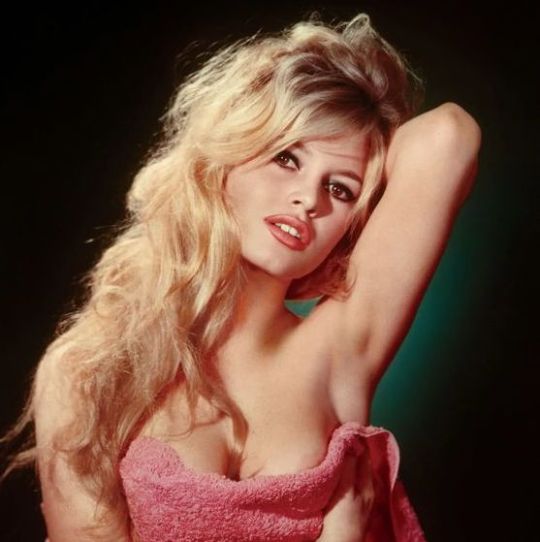
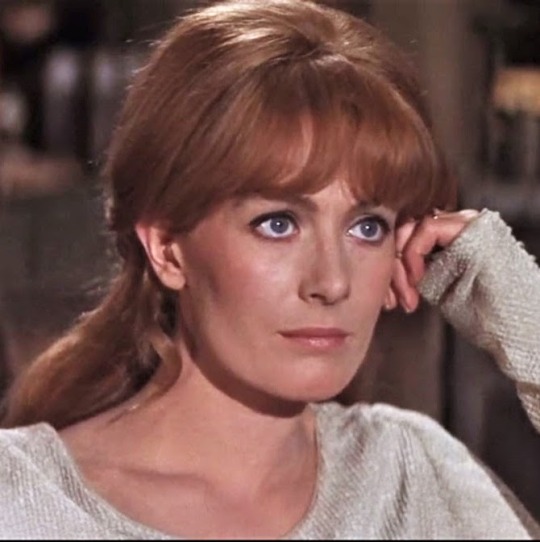
Propaganda
Brigitte Bardot (Contempt, And God Created Woman)—unbelievable charisma off the charts, post-war France could barely handle her because she just radiates sexuality in the deepest, hottest way. i've never seen a woman who fit so clearly in my head the "beautiful woman" category. also i'm including her little suit number because why not [pic below]
Vanessa Redgrave (Camelot)—Partially submitted as justice for her father, and you should all know her birth was announced to a theatre audience by Laurence Olivier. But for herself, she is a wild untameable beauty who was in some of the best avant garde cinema of the period.
This is round 2 of the tournament. All other polls in this bracket can be found here. Please reblog with further support of your beloved hot sexy vintage woman.
[additional propaganda submitted under the cut.]
Brigitte Bardot:
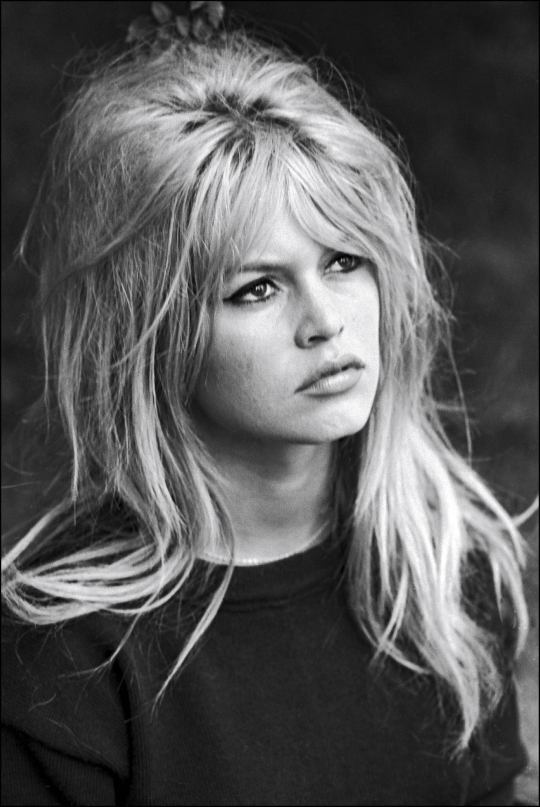
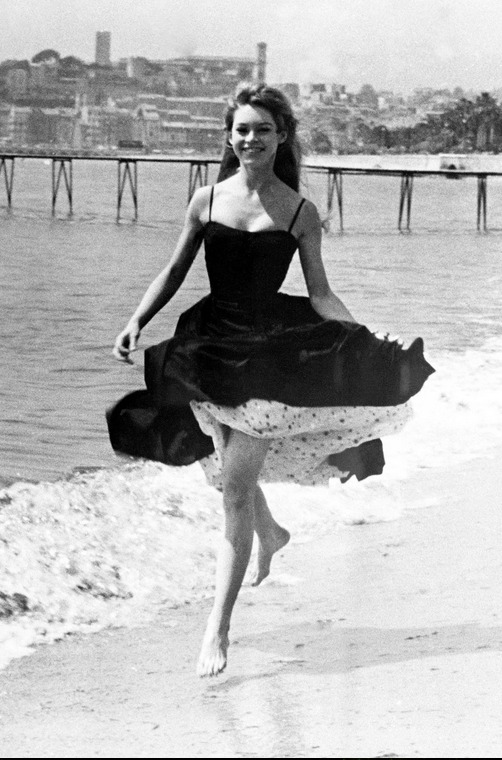
"Los Angeles Times in 2011 ranked her as the second most beautiful woman in film, she won a David di Donatello award and was nominated for a BAFTA. Literally nicknamed a sex kitten, she used her fame to promote animal rights. And God Created Woman was so scandalous to US audiences that some theater managers were arrested for screening it"

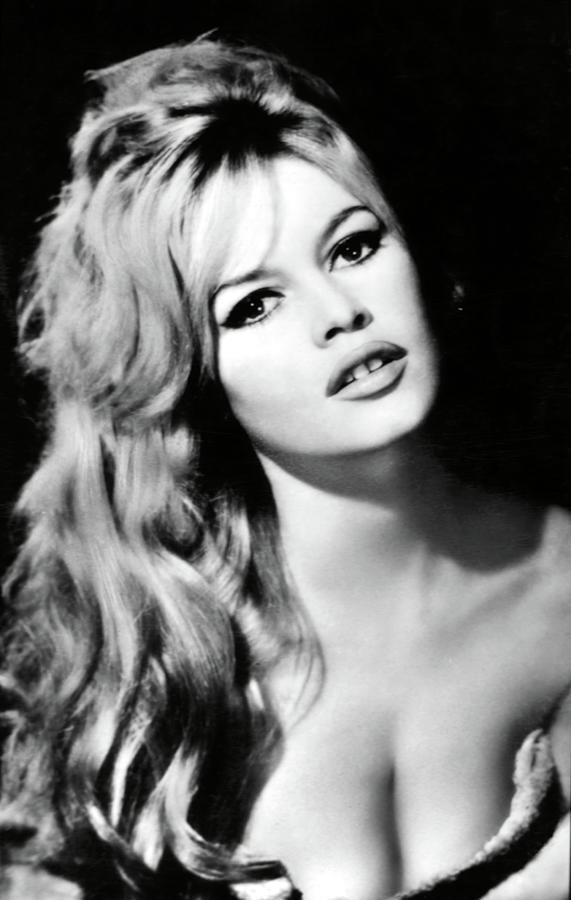
"She was a sex symbol and her style is influential even today"
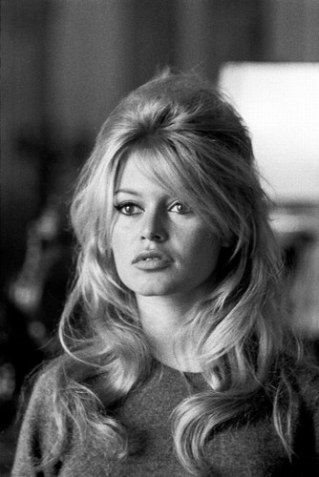
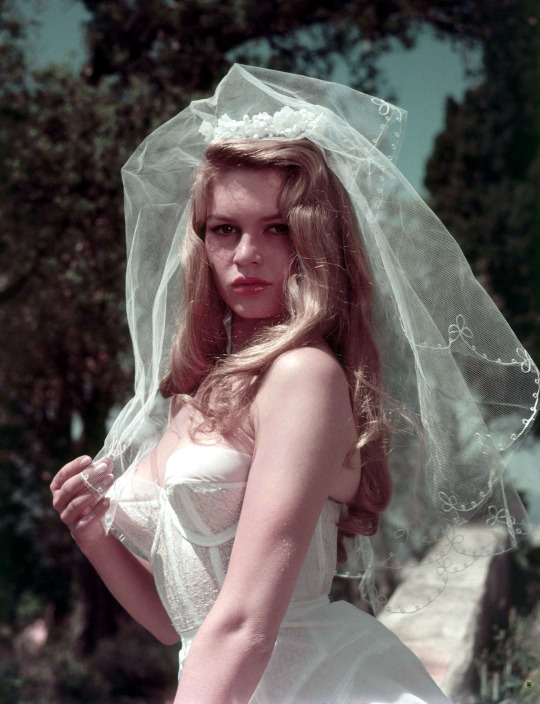
"She's just so iconic! Wikipedia extracts because why not : "In 2011, Los Angeles Times Magazine's list of "50 Most Beautiful Women in Film" ranked her number two" "The Guardian named Bardot "one of the most iconic faces, models, and actors of the 1950s and 1960s" "According to the liner notes of his first (self-titled) album, musician Bob Dylan dedicated the first song he ever wrote to Bardot. " I mean of course she is iconic in France, but she inspired many women outside of France"
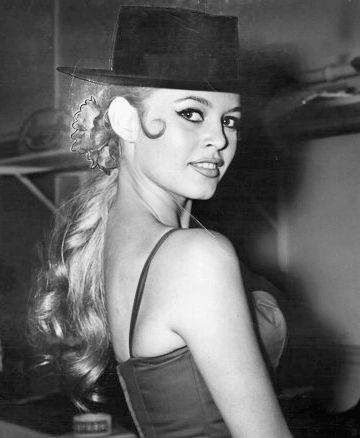
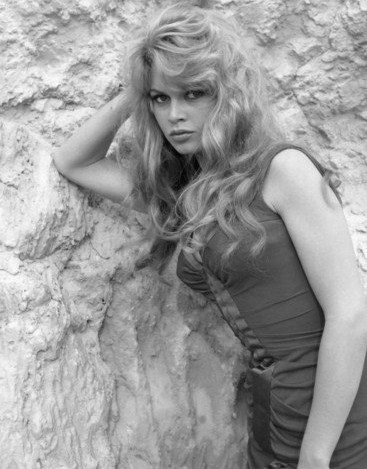
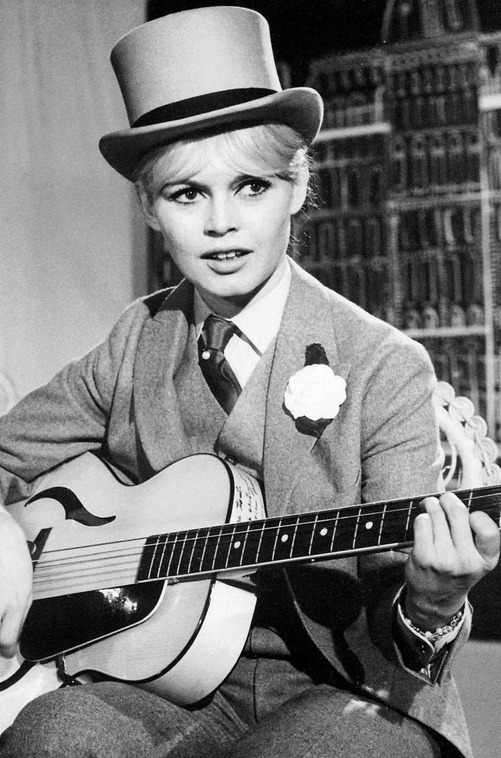
"She wasn't just a sex symbol because men found her attractive and then that imagine of her was further promoted. But she was actually one of (if not) the first women to stand for emancipated women in a sexual way in a time when women were considered to mainly exist to please their man. She was famous for portraying women who lived their sexuality for their own pleasure and knew what they wanted. Very important! And also what's hotter than a woman driving men wild because they don't even know how to handle a woman with her own ideas and needs lol"

Vanessa Redgrave propaganda:
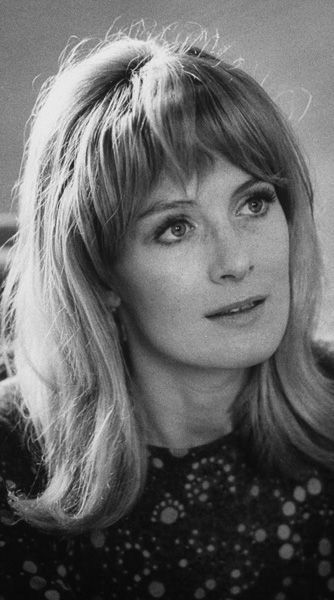

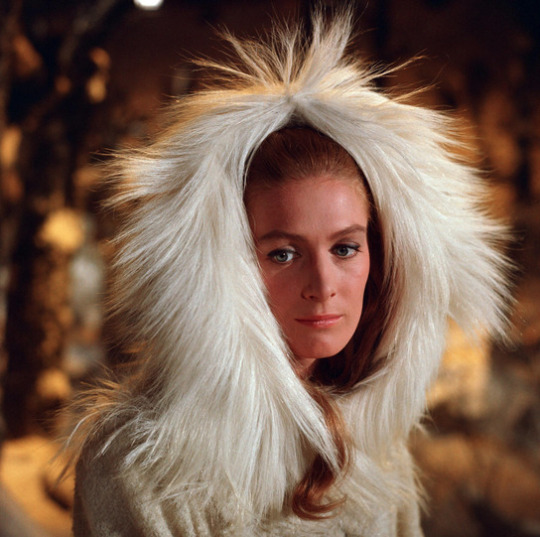
439 notes
·
View notes
Text
SHAKESPEARE AND THE PRETTY SPEECHES OF A KING
@ardenrosegarden @amalthea9 @lioness--hart @princesssarisa @hmmm-what-am-i-doing @suits-of-woe @malvoliowithin @noshitshakespeare
I was once watching Brows Held High review of Laurence Olivier’s Henry V (1944), where the reviewer, Kyle Kalgreen, analized how it faired in the context of British World War II Propaganda Machine, as a Shakespeare film adaptation and in comparison to the Kenneth Branagh 1989 Film Adaptation.
There is a moment he pauses to analyze the most popular speech of the play, wich is the Saint Crispin’s Day Speech:
What’s he that wishes so?
My cousin Westmoreland?
No, my fair cousin.
If we are marked to die, we are enough
To do our country loss; and if to live,
The fewer men, the greater share of honor.
God’s will, I pray thee wish not one man more.
By Jove, I am not covetous for gold
Nor care I who doth feed upon my cost;
It yearns me not if men my garments wear;
Such outward things dwell not in my desires.
But if it be a sin to covet honor,
I am the most offending soul alive.
No, faith, my coz, wish not a man from England.
God’s peace, I would not lose so great an honor
As one man more, methinks, would share from me,
For the best hope I have.
Oh, do not wish one more!
Rather proclaim it,
Westmoreland, through my host,
That he which hath no stomach to this fight,
Let him depart.
His passport shall be made,
And crowns for convoy put into his purse.
We would not die in that man’s company
That fears his fellowship to die with us.
This day is called the feast of Crispian.
He that outlives this day and comes safe home,
Will stand o' tiptoe when the day is named
And rouse him at the name of Crispian.
He that shall see this day, and live old age,
Will yearly on the vigil feast his neighbors
And say, “Tomorrow is Saint Crispian.”
Then will he strip his sleeve and show his scars,
And say, “These wounds I had on Crispin’s day.”
Old men forget; yet all shall be forgot
But he’ll remember with advantages
What feats he did that day.
Then shall our names,
Familiar in his mouth as household words,
Harry the King, Bedford and Exeter,Warwick and Talbot,
Salisbury and Gloucester,
Be in their flowing cups freshly remembered.
This story shall the good man teach his son,
And Crispin Crispian shall ne'er go by,
From this day to the ending of the world,
But we in it shall be rememberèd—
We few, we happy few, we band of brothers;
For he today that sheds his blood with me
Shall be my brother; be he ne'er so vile,
This day shall gentle his condition;
And gentlemen in England now abed
Shall think themselves accursed they were not here,
And hold their manhoods cheap whiles any speaks
That fought with us upon Saint Crispin’s day.
(William Shakespeare. Henry V: Act IV, Scene III)
Beautifull. Powerfull. Lie.
Because, as Kyle Kalgreen apoints, while the Laurence Olivier had to cut it to make Henry V more simpathetic, the original Shakespeare text and the Kenneth Branagh Film Adaptation have this scene following the Saint Crispin’s day speech, where the young king reads a list of the english man who died in battle:
Edward the duke of York, the earl of Suffolk,
Sir Richard Ketly, Davy Gam, esquire;
None else of name, and of all other men
But five and twenty. O God, thy arm was here,
And not to us but to thy arm alone
Ascribe we all! When, without stratagem,
But in plain shock and even play of battle,
Was ever known so great and little loss
On one part and on th' other?
Take it, God,For it is none but thine.
(William Shakespeare, Henry V: Act IV, Scene VIII)
The death nobleman are named, while the death common soldier is just ‘None else of name’. The death nobleman is ‘so great loss’. The death common soldier is ‘so little loss’. Contrary to what King Henry V promissed, not everybody who died fighting on his name in France will be considered his brother, remembered and mourned by him.
And them later, we watch the consequences of the reign of his son in the Henry VI trilogy of plays, and in Henry VI Part III, our new protagonist gives this beautifull speech about the blessing of a commoner’s life while sitting over a molehill:
This battle fares like to the morning’s war,
When dying clouds contend with growing light,
What time the shepherd, blowing of his nails,
Can neither call it perfect day nor night.
Now sways it this way, like a mighty sea
Forced by the tide to combat with the wind;
Now sways it that way, like the selfsame sea
Forced to retire by fury of the wind:
Sometime the flood prevails, and then the wind;
Now one the better, then another best;
Both tugging to be victors, breast to breast,
Yet neither conqueror nor conquered:
So is the equal of this fell war.
Here on this molehill will I sit me down.
To whom God will, there be the victory!
For Margaret my queen, and Clifford too,
Have chid me from the battle; swearing both
They prosper best of all when I am thence.
Would I were dead! if God’s good will were so;
For what is in this world but grief and woe?
O God! methinks it were a happy life,
To be no better than a homely swain;
To sit upon a hill, as I do now,
To carve out dials quaintly, point by point,
Thereby to see the minutes how they run,
How many make the hour full complete;
How many hours bring about the day;
How many days will finish up the year;
How many years a mortal man may live.
When this is known, then to divide the times:
So many hours must I tend my flock;
So many hours must I take my rest;
So many hours must I contemplate;
So many hours must I sport myself;
So many days my ewes have been with young;
So many weeks ere the poor fools will ean:
So many years ere I shall shear the fleece:
So minutes, hours, days, months, and years,
Pass’d over to the end they were created,
Would bring white hairs unto a quiet grave.
Ah, what a life were this! how sweet! how lovely!
Gives not the hawthorn-bush a sweeter shade
To shepherds looking on their silly sheep,
Than doth a rich embroider’d canopy
To kings that fear their subjects’ treachery?
O, yes, it doth; a thousand-fold it doth.
And to conclude, the shepherd’s homely curds,
His cold thin drink out of his leather bottle.
His wonted sleep under a fresh tree’s shade,
All which secure and sweetly he enjoys,
Is far beyond a prince’s delicates,
His viands sparkling in a golden cup,
His body couched in a curious bed,
When care, mistrust, and treason waits on him.
(William Shakespeare. Henry VI Part III: Act II, Scene V)
Also a beautifull and powerfull speech, if a bit revealing of a romanticized view of the poverty that Henry VI never lived. And also a lie, or, at least, a half truth for Henry VI himself.
By contrast to the Molehill Speech, here is the dialogue exchange between him and two keepers, in the next act:
Second Keeper
Say, what art thou that talk'st of kings and queens?
Henry VI
More than I seem, and less than I was born to:
A man at least, for less I should not be;
And men may talk of kings, and why not I?
Second Keeper
Ay, but thou talk'st as if thou wert a king.
Henry VI
Why, so I am, in mind; and that's enough.
Second Keeper
But, if thou be a king, where is thy crown?
Henry VI
My crown is in my heart, not on my head;
Not decked with diamonds and Indian stones,
Nor to be seen: my crown is called content:
A crown it is that seldom kings enjoy.
Second Keeper
Well, if you be a king crown'd with content,
Your crown content and you must be contented
To go along with us; for as we think,
You are the king King Edward hath deposed;
And we his subjects sworn in all allegiance
Will apprehend you as his enemy.
Henry VI
But did you never swear, and break an oath?
Second Keeper
No, never such an oath; nor will not now.
Henry VI
Where did you dwell when I was King of England?
Second Keeper
Here in this country, where we now remain.
Henry VI
I was anointed king at nine months old;
My father and my grandfather were kings,
And you were sworn true subjects unto me:
And tell me, then, have you not broke your oaths?
First Keeper.
No;
For we were subjects but while you were king.
Henry VI
Why, am I dead? do I not breathe a man
Ah, simple men, you know not what you swear!
Look, as I blow this feather from my face,
And as the air blows it to me again,
Obeying with my wind when I do blow,
And yielding to another when it blows,
Commanded always by the greater gust;
Such is the lightness of you common men.
(William Shakespeare. Henry VI Part III: Act III, Scene I)
We can perceive here a condescending tone that King Henry VI has when he talks with two members of the people. He is surprised to see that they don’t believe in a divine right that gives him a “natural kingly aura”. They don’t see him as a superior, wise and benevolent saviour, but only as a man who once weared a crown, but now, without the crown, they don’t have any obligation to obey him.
And Henry VI can’t accept that.
Later, he is rescued by Clifford, Warwick and Clarence from imprisoment under King Edward IV’s rule. And when those three man offer him back the crown and title of king, he don’t refuse it to live the simple commoner life he described as more beautifull in the Molehill Speech. He accepts it. Even if he intends to let the actual work of ruling to Warwick, Clarence and Queen Margaret, he still wants the sense of superiority, the privileges and the confortable life offered by the title of king that he grew accustomed to since he was nine months old.
By justaposing those speeches and scenes, Shakespeare pulls us of the rug in our view of those two characters, who want the people to believe they are good, heroic and chivalrous kings, anointed by God himself, when in reality what anoints them is their money and their armies.
Intentionally or not, with those plays, Shakespeare was at the same being a precursor and subvertor of the Relatable Royal Trope, showing that those people with the title of kings are like us... but not really.
They feel sadness, fear, anger, love, envy and jealousie like us, but they are more rich, powerfull and privileged then us.And they don’t really want to renounce that power, because it will take away their sense of being superior to us.
To paraphrase Kyle Kalgreen:
Beware pretty speeches
(Kyle Kalgreen. Brows Held High: This Day is Called the Feast of Crispian, a review of Laurence Olivier’s Henry V. October 26th, 2018)
Specially if they come from a person that wears the crown of a king.
#history plays#theater#literature#tragedies#shakespeare#william shakespeare#will shakespeare#henry v#henry vi#the wars of the roses#bardolatry#brows held high#kyle kalgreen#cinema#laurence olivier
29 notes
·
View notes
Text
Best Wuthering Heights adaptation? Character comparison

Wuthering Heights is one of my favourite books, but the screen adaptations are... not very good. From adapting only half a book to completely changing the ending they continue to make odd odd choices in adapting this book. I can’t blame them though since the book is basically unfilmable. I did my best trying to rank these adaptations, but none of them can really be called a “winner”.
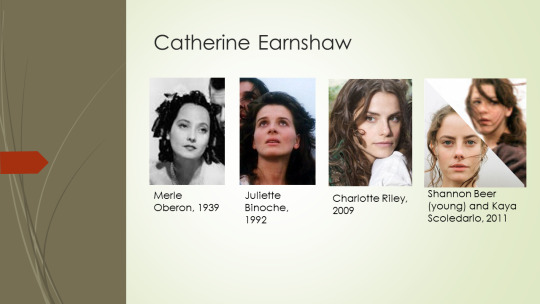
1939: Oberon is too whiny. I'll never forget her "Heathcliiifff!!" when the dog bites her leg. Not awful, but definitely not Cathy either. After marrying Edgar she is far too composed and regal. Oberon does portray some arrogance and gets angry once in a while, but doesn't really show Cathy's unstable nature.
1992: She is not fierce enough to be Cathy, and her giggling in the beginning is enough to drive one mad. She makes the emotional and "softer" scenes work well and with Ralph Fiennes they capture the more pleasant moments of the relationship but definitely miss out on the "passionate" and "eternal". Overall I like some aspects of her performance and she shows the growth of the character with less than stellar direction. She just misses out a big time on passion and fierceness, but makes up for it with kind of lunacy so her Cathy is unstable, just in a different way.
2009: Charlotte Riley's Cathy is probably least Cathy-like out of the four I've watched. She is kind and caring, scolds Heathcliff for being mean, gives food to poor, is instantly friends with Isabella.. She shows all her emotions to Heathcliff and instead of the twisted games and hate-passion they have in the book, this Cathy is just a simple woman in love with Heathcliff, who is playing with her. Instead of knowing that they are everything to each other, that they are each other, they just have common jealousy. This is just bad.
2011: The younger version of Cathy is maybe not spicy enough but she is good and her bond with Heathcliff is shown well. Kaya Scoledario on the other hand is about as interesting as watching that nth shot of the muddy moor. This version of Cathy also has a weird interest in drinking blood.
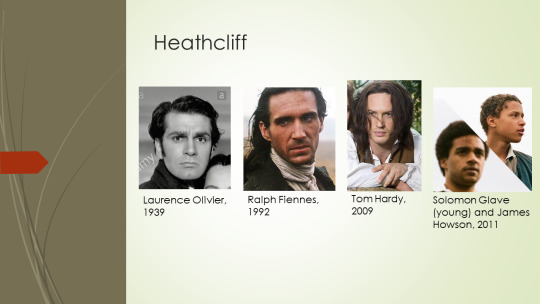
1939: Laurence Olivier has absolutely zero Heathcliff in him. His Heathcliff is romantic, talkative and calm. Heathcliff as a romance novel hero. Also Olivier is as wooden as the giant block of wood he throws in to the fire in the beginning.
1992: Ralph Fiennes starts out as a bit too sophisticated for Heathcliff, but his performance definitely gets better after Heathcliff returns. He is cruel underneath his somewhat gentlemanly facade that he doesn't really work to upheld once he gets what he wants. I actually rather like his performance, even though it doesn't reach his book heights of cruelty.
2009: Tom Hardy makes for a chatty Heathcliff. He is a bit evil, sure, but also way too social. He doesn't seem to hide any kind of dark feelings behind his quippy exterior. If he's happy, he is, if he's angry, he is. Change in his three years away is nonexistent since he was already so at home around everyone. I'm also confused how after 18 years he just decides to blow his brains out. Ok.
2011: Again young Heathcliff is portrayed well Solomon Glave but the older one.. less so. Boring is really the only way to describe James Howson's performance. He seems like he is not interested at all in Cathy or anything really. He is just floating around the screen. He sounds curiously like Jon Snow and that is not a good thing.
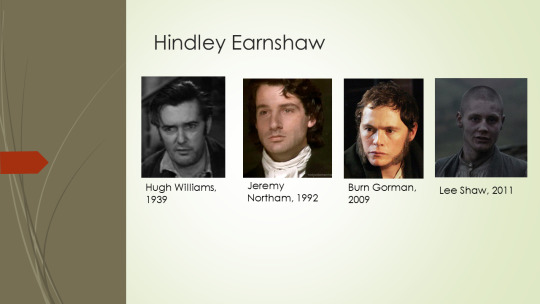
1939: There is not much to say about his Hindley really. He is utterly forgettable.
1992: Unfortunately the curse of forgettableness follows Hindleys. Jeremy Northam beats Heathcliff up once but is really reduced to nothing in this film. Around the middle he then just dies off.
2009: Gorman's Hindley is weirdly happy and loving before Frances' death, but turns out to be a passable drunk afterwards. I especially like him meantioning his plans to kill Heathcliff. The Hidnley-Heathcliff dynamic in the beginning paints Heathcliff as a victim, so Hindley being a passable person for a while is an odd choice. However I remember him so that’s a bonus.
2011: Well he is racist for sure. I guess the skinhead look is some very very clever social commentary.

1939: David Niven as Edgar was... an interesting choice. He doesn't get much to do, mostly standing around and frowning at Heathcliff.
1992: I'm well aware of being very biased here, but Simon Shepherd truly looks like I've always imagined Edgar Linton looking like. He is just the perfect Edgar to me no contest. I think he captures Edgar from the book very nicely.
2009: Andrew Lincoln is far too manly and dark to be the light-coloured, bloodeless Edgar. He is also too mean in this version.
2011: I really don't have anything to say about this man. Edgar is on-screen for maybe half a minute and that is the less interesting half so I may have missed it.

1939: Isabella doesn't come off as such a fool since Heathcliff is 10000x more pleasant than he really is. Fitzgerald plays Isabella fine enough. She looks way too much like Cathy tho.
1992: I just hate how they cut out the scene of Isabella running away, as it is one of my favourite scenes and really makes Isabella's character into something more than a lovesick fool. Without that Sophie Ward doesn't really have much to do.
2009: Isabella gets some "development" in this series, we are seen her looking for suitors at Cathy's wedding and she explains some of her reasons for being interested in Heathcliff. Rest of the movie she looks sadly around eyes wide. They had Isabella leaving Heathcliff and completly butchered that. I'm Angry >.<
2011: Cmon Isabella. This Heathcliff is in no way interesting. He doesn't even have any "dark sexual attraction". We never see what might make Isabella interested in Heathcliff and I mean, who really cares anyway? If you're paying attention at this point I salute you. Okay I'm back since I noticed the movie is ending. They had the scene where Isabella and Hindley shut Heathcliff out so that's fun.

1939: Best thing about Flora Robson is that she vaguely resembles Jane McTeer. She doesn't really have a large role. What she has she does well enough.
1992: Janet McTeer is my love and joy. She is too old in the beginning, sure, and for the rest of the movie looks like she is in her 40s, but she is so so lovely as Nelly. I love her acting in "I am Heathcliff" scene and in her scenes with Heathcliff. She is the reason I like this movie so much despite its many failings.
2009: Nelly is way too old, which changes her relationship with all the characters. The actress does her grandma-role fine, giving shocked looks underneath her biddy bonnet.
2011: Ummm... Congrats for being the right age? This Nelly really doesn't have a role.



It was rather hard to rate the second generation since the 1992 movie was the only one to actually properly include it.
#wuthering heights#bronte#emily bronte#perioddrama#period drama#tom hardy#charlotte riley#juliette binoche#ralph fiennes#jane austen
26 notes
·
View notes
Photo

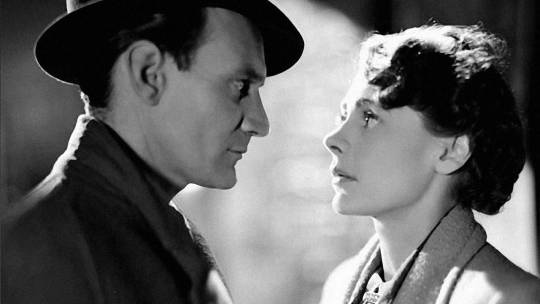
Movies I watched this week - 40
My first Mongolian film, The Eagle Huntress, a documentary about Aisholpan, a 13 year old Kazakh girl who aspires to become a hunter, like her father and grandfathers before her. Touching and gorgeous, it must be staged, no? because I can’t see how they filmed it.
Girl Power! 9/10
✴️
2 by Michael Haneke:
✳️✳️✳️ Caché (”Hidden”), a fully-immersive story about a Parisian couple who discovers a surveillance video cassette of their house, left on their doorstep. Deep exploration of guilt and culpability. A mystery that is not resolved, with Daniel Auteuil and Juliette Binoche.
Best film of the week!
✳️✳️✳️ His episodic Code Unknown (2000) seems like a earlier study in similar themes and style, even with 4 of the same actors, including Juliette Binoche whose laughter is so infectious. Meandering story lines and camera shots about regrets and social inequities. 5/10
✴️
And 2 more with Juliette Binoche:
✳️✳️✳️ More Binoche in Non-fiction, another of Olivier Assayas’ frothy, breezy film-desserts, where French writers and intellectuals are going from cafes to bistros, discussing literature and media over coffees and wine, and have affairs with everybody, all the while maintaining good spirits and go back in the morning to their gorgeous wives and have a laugh about it. Simply magnificent!
✳️✳️✳️ Clouds of Sils Maria, their previous collaboration. I loved the first half, as famous actress Binoche travels by train to accept an award on behalf of a reclusive writer, and learns that he just died. But I got distracted later when her and her personal assistant’s relationship is blurred to reflect the dual lesbian roles of the dead writer’s fictional play.
✴️
Brief Encounter, David Lean and Noël Coward’s story of unconsummated love affair between two married strangers, a romantic “Cheating”, repressed passion on a railway station platform.
Prompted By this comment.(Photo Above).
✴️
2 by Andrey Zvyagintsev:
✳️✳️✳️ Elena, engrossing Russian story about an old, wealthy man who, after a heart attack, decides to leave his money to his daughter, but not to the wife who dutifully takes care of him. Mundane and slow, but gripping and suspenseful. 7+/10
✳️✳️✳️ Leviathan - Set in a remote fishing Russian town up in the Kola peninsula, the hothead car mechanic “Kolya” doesn’t look like a modern day Job, but slowly and tragically he becomes one, losing everything he has. It’s surprising it was allowed to be made in Putin’s Russia. 7+/10
✴️
That thing you do, written and directed by Tom Hanks exactly 25 years ago. An infectious happy little gem, shot at downtown Orange, CA, at the “Orange Circle” when I lived close by there. Perfectly nostalgic.
✴️
4 by Michael Winterbottom:
✳️✳️✳️ Code 46, a futuristic Blade Runner style forbidden love story between Tim Robbins and Samantha Morton. A moody Sci-Fi Noir which blends the dystopian locations of Shanghai and the Dubai desert into a post-modern melting pot nightmare.
8/10
✳️✳️✳️ Greed, a brutal satire with Steve Coogan, sporting a giant set of new fluorescent teeth, as a billionaire high-street fashion mogul and the build-up to his 60th birthday celebrations on the island of Mykonos. With a delightful cameo by ‘In The Loop’ Jamie McDonald.
✳️✳️✳️ A Cock and Bull Story, a wonderful film-within-a-film, about making of a screen adaptation of Laurence Sterne's novel Tristram Shandy. Like ‘8½’ and ‘Day for Night’ and other behind-the-scene meta-films, and just as the novel was about a man unable to finish his autobiography, this comedy is about the failure to finish the movie. It even uses Nino Rota’s Fellini scores
It was the first time Winterbottom directed Steve Coogan and Rob Brydon playing themselves.
✳️✳️✳️ The Trip was the later installment of that ‘series’ of 4 travelogues, whereby Steve Coogan and Rob Brydon, playing a version of themselves, drive somewhere (Northern England, Italy, Spain, Greece), eat good food, enjoy the views and have fun with each other’s company. Light, quirky, delightful. (Re-watch).
“Everything’s exhausting when you’re past 40...”
✴️
Enemy, my second Denis Villeneuve film (after ‘Sicario’), loosely based on José Saramago‘s novel ‘The Double’. 2 X Jake Gyllenhaal in an atmospheric doppelganger mystery, confusing & somehow unexplained. I didn’t get the subconscious meaning of the title, ‘Enemy’. Spider City. 4/10
✴️
More of Anders Thomas Jensen!
✳️✳️✳️ I watched Riders of Justice again, maybe the 6th time this year. I am attracted to genius screenwriter Anders Thomas Jensen‘s scripts like a moth to light. This - only the 5th feature film he directed himself - is a perfect film.
✳️✳️✳️ Ernst & The Light though is a 1996 short when his talents were just beginning to show. A businessman picks up a hitchhiker at night, but doesn’t realize it’s Jesus Christ himself.
✴️
Simon of the desert, Buñuel’s last, absurd Mexican film and the third of three movies starring Silvia Pinal. Surrealistic blasphemy.
“Thank God I’m still an atheist...”
✴️
Pier Paolo Pasolini X 2:
✳️✳️✳️ Love Meetings is a 1965 Pasolini documentary about sexual mores in Italy of that time. Traveling around the country, he interviewed random people in public places of their opinions about sexuality and gender roles. Most were ignorant and very conservative.
✳️✳️✳️ My first Abel Ferrara. His 2014 deferential dramatization of Pasolini last days. Surprisingly, I liked the fact that it was dubbed into Italian, as well as Willem Dafoe striking resemblance to PPP. But I think I should stop watching most biographies.
✴️
2 X Steve Martin / Carl Reiner comedies:
✳️✳️✳️ Dead Men Don't Wear Plaid, Carl Reiner (AKA ‘Field Marshal Wilfried von Kluck’) and Steve Martin's 1982 homage to / parody of detective noir of the '40s. With Bogart, Cagney, Ingrid Bergman, Joan Crawford, Bette Davis, Veronica Lake, Lana Turner, etc. Still funny!
“What are you doing!?
- Adjusting your breasts. You fainted, and they’re all out of whack...”
✳️✳️✳️ The Jerk: Wild and crazy guy is sexually naive until he is initiated by Patty the daredevil stunt woman.
“...You mean I’m gonna stay this color?...”...
✴️
Re-watching Ray Liotta X 2:
✳️✳️✳️ Field of Dreams: Still perfect. Burt Lancaster’s final role was his most iconic yet. James Horner score is one of the main characters of the story. Direction and editing of this movie is still perfect. (Karin’s Gaby Hoffmann was Viva’s daughter.)
✳️✳️✳️ Something Wild, by Jonathan Demme. Crazy attraction between a quirky Wild Thing and a no-personality Yuppie. I still can’t see what she saw in him. 5/10
✴️
Al Pacino is Jack Kevorkian who championed a terminal patient's right to die by physician-assisted suicide, in Barry Levinson’s standard 2010 celebrity biopic, You don’t know Jack. With Adam Driver as a badly-burnt paraplegic. Meh.
✴️
The Manchurian Candidate, a horribly-mangled Cold War anti-commie propaganda vehicle, with lame love story, brain washing, and Joe McCarthy substitute. 1/10
- - - - -
(My complete movie list is here)
2 notes
·
View notes
Text
Timothée Chalamet and Eileen Atkins Interview - British Vogue May 2020

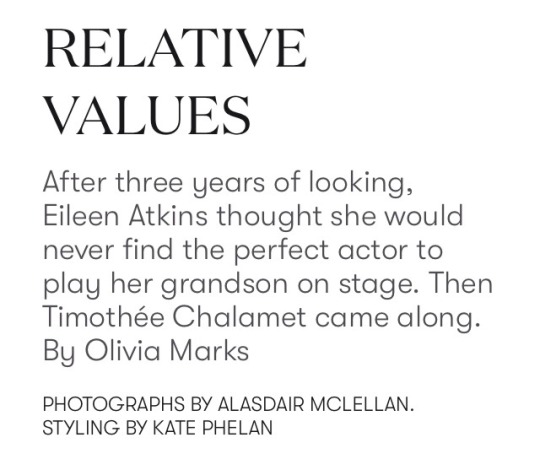
“Maybe your knuckles weren’t bleeding, but there was ice,” Timothée Chalamet tells Dame Eileen Atkins. He is recounting, with no small amount of awe, how he first came to hear of the legendary 85-year-old actor with whom he is about to appear at The Old Vic. It transpires that Oscar Isaac, Chalamet’s co-star in the upcoming blockbuster Dune, was at the receiving end of Atkins’ fist in Ridley Scott’s Robin Hood (all in the name of acting, of course). Chalamet was duly impressed.
“I gave him the worst time of his life,” says Atkins, bristling at the memory, before merrily launching into several candid, very dame-like stories from her time on set – “That was a nightmare movie. A nightmare.”
It is a Saturday afternoon in late February, and the two actors – one a titan of British theatre with an eight-decade career; the other, Hollywood’s most in-demand young leading man, with an insatiable Instagram following – have just finished being photographed together for Vogue. Chalamet, 24, in louche, low-slung denim and a white T-shirt, has folded his Bambi limbs into a chair next to Atkins, whose hawkish frame, in a navy jumper and jeans, belies her 85 years.
“Do you like being called Tim or Timothée or what?” Atkins asks in her warm but brisk RP, all trace of her Tottenham upbringing erased.
“Whatever works,” he replies in a bright American accent, that shock of chestnut hair falling into his eyes. “Anything.”
“So you won’t object to ‘darling’? I call everyone darling. I’m told I mustn’t say it these days.” He assures her he is fine with it: “It’s a rite of passage, being called darling by Dame Eileen Atkins.”
“You always, always, have to put the dame in, otherwise you can’t address me,” she jokes.
It’s good the two are getting all this sorted now. A couple of days after our interview they will begin rehearsals for a seven-week run of Amy Herzog’s play 4000 Miles, in which they star as a grandmother and grandson, each quietly dealing with their own grief. Chalamet takes on the role of Leo Joseph-Connell, a somewhat lost 21-year-old who experiences a tragedy while on a 4,000-mile-long cycle ride with his best friend. Atkins plays Vera Joseph, his widowed 91-year-old grandmother, upon whose Manhattan doorstep Leo unexpectedly arrives in the middle of the night, unsure of where else to go. What follows is a wonderful, and wonderfully witty, study in human relationships, a portrait of two generations with decades between them trying to make sense of the world.
Its stars, who’ve met twice previously, in New York last year, are still very much getting to know each other – and are confident in the appeal. “There are things like this play – hoping I don’t butcher it – where you can just sit back and go, ‘Oh, this is a delicious meal,’” says Chalamet. Atkins agrees. “I have a phrase in mind that I shouldn’t really say because it’s going to sound terrible in print.” Which is? “I find it a dear little play, a really dear little play. I think it should be very moving. But who knows? We might f**k it up.”
It’s unlikely. Atkins has been a regular on The Old Vic’s stage since the 1960s, going toe-to-toe with greats from Laurence Olivier to Alec Guinness, and fellow dames (and close friends) Maggie Smith and Judi Dench. Chalamet, meanwhile, is a relative novice, with only two professional plays under his belt. But since his turn as Elio in 2017’s Call Me by Your Name (for which he was Oscar-nominated), his celluloid rise has been meteoric. Roles in Lady Bird, Little Women, The King and Wes Anderson’s upcoming The French Dispatch have not only earned him the slightly fraught badge of “heart-throb”, but proved him to be among the most captivating actors of his generation.

He says he couldn’t resist the opportunity to come to the capital. “There was something exciting about doing a play that feels very New York in London,” Chalamet explains of taking on the part. He’s a diehard theatre fan, too, revealing he saw the six-and-a-half-hour epic The Inheritance – twice. “There are films like The Dark Knight or Punch-Drunk Love or Parasite that can give you a special feeling. But nothing will be like seeing Death of a Salesman on Broadway with Philip Seymour Hoffman or A Raisin in the Sun with Denzel Washington.”
Herzog’s writing particularly spoke to him. “Leo’s in a stasis that was very appealing to me,” he continues. “We find our crisis in moments of stasis, but there’s an irony to it when you’re young, because the law of the land would have you think that to be young is to be having fun, to be coming into your own. But as everyone at this age who’s going through it knows, it’s often a shitshow.”
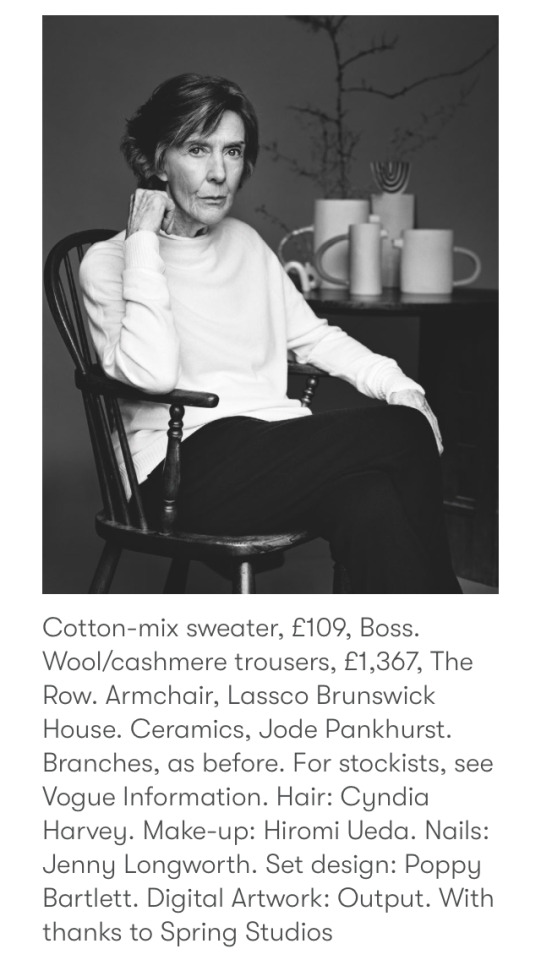
It’s safe to say that, in casting terms, director Matthew Warchus, also artistic director of The Old Vic, has hit the jackpot. He first took the play to Atkins three years ago, but it was only towards the end of 2019 that Chalamet came on board. When it was announced, in December, that Hollywood’s heir apparent to Leonardo DiCaprio would be making his London stage debut, the news was met with a level of hysteria not usually associated with the 202-year-old theatre’s crowd.
“Oh, my friends have told me who the audience is,” Atkins chimes in when I ask who they think will be coming to see the show. “It’s 40 per cent girls who want to go to bed with Timothée, it’s 40 per cent men who want to go to bed with Timothée, and it’s 20 per cent my old faithfuls.” Is Chalamet prepared for the onslaught? “I think it will be 100 per cent Eileen’s faithfuls,” he demurs.
On the surface, they can seem quite the odd couple. Chalamet, raised in Manhattan by an American dancer-turned-realtor mother and French father, an in-house editor at the United Nations, may be living a breathless, nomadic movie-star life but there’s an iron core of Gen Z earnestness there. He arrives on set with minimal fuss, even deciding to wear the clothes he came in for one shot, before knocking out some push-ups, politely ordering an omelette and generally being divinely well-mannered.
He turns on the star power for the camera, though, and I can confirm it’s as dazzling up close as it is on the red carpet, where he has, famously, casually redrawn the rules for male dressing. From that Louis Vuitton sparkly bib at the 2018 Golden Globes, to a dove-grey satin Haider Ackermann tux at Venice last year, he’s a true fashion darling. Then, of course, there’s his dating life – from Lourdes Ciccone Leon to Lily-Rose Depp – that remains an endless source of fascination to millions worldwide. (All this, it must be said, is of significantly less interest to Dame Eileen.)
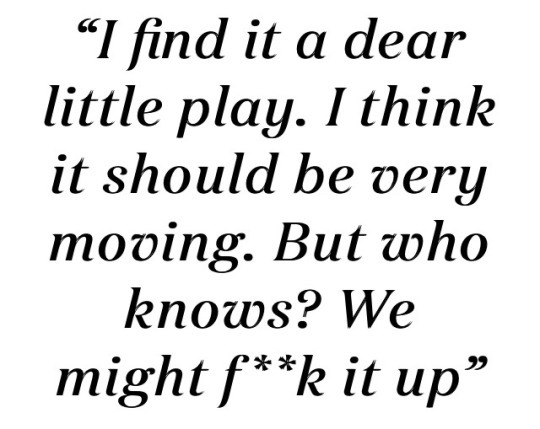
Atkins started dance lessons aged three, shortly before the start of the Second World War. By 12, she was performing professionally in pantomime, not far from where she grew up in north London, the youngest daughter in a working-class family. A fast-established theatre star, wider fame didn’t find her until late in life. Despite memorable turns in Upstairs, Downstairs and Gosford Park, it was the 2000 television hits Cranford and Doc Martin, when she was in her early seventies, that finally made her a household name. Today, she lives alone in west London, since her second husband, the TV and film producer Bill Shepherd, died in 2016. She has often spoken of being happily childless, and has zero time for razzmatazz.
And yet, despite their differences, the pair appear perfectly matched. They already have their grandmother-grandson dynamic down pat. Atkins does a fine line in mischievous eyebrow-raising, and at one point recites a limerick that is, honestly, so rude it almost makes her co-star blush. Chalamet, meanwhile, is politeness personified, still trying to work out his thoughts on various subjects, less inclined to give so much of himself away. There is a physical likeness, too, in their delicate features and fine bone structure. They share a naturally melancholic look, one that melts away when they laugh.
Their upcoming play, which premiered to rapturous reviews Off-Broadway in 2011, “about a block” from Chalamet’s high school, LaGuardia, could have been written for them. “Other than not being American, I’m very like the old woman,” says Atkins of the Pulitzer-shortlisted play. “I can’t be bothered to learn the internet.” If there’s one thing she won’t tolerate in rehearsals, it’s people on their phones. That’s the only thing that will “piss me off ”, she says, brusquely.
Ah, phones. Are they really the symbol of generational disconnect? “It’s easy to point to these things,” Chalamet says, tapping his phone on the table, “as the cause or the symptom, but I think my generation is a guinea pig generation of sorts. We’re figuring out the pros and cons and limits of technology.”
Equally, Atkins is keen to distance herself from some of the criticism levelled at her age group. “There’s a saying isn’t there: if you’re not very left wing when you’re young, you’re heartless. And if you’re not very right wing when you’re old, you’re foolish. I’m not political, but I’m not with this government I can assure you – and I’m not with Brexit. I wanted to wear a sweater saying ‘I did not vote Brexit’, because it was all old people who did. Not me, not me,” she snaps. “I went on the march.”
Both are in agreement that intergenerational friendships are too rare these days. “So. Important,” Chalamet says, hitting the table between each word. “There is so much to learn from people who have walked the path of life. That’s why I’m so looking forward to these next couple of months.”
Atkins is thoughtful on the matter. “I don’t miss the fact I don’t have children, but I do envy my friends who have grandchildren,” she says. “About five or six years ago I met a couple of young people – they are just about 30 this year – and, do you know, we go out together. And people immediately say to me, ‘Are these your grandchildren?’ And I say, ‘No.’ And they say, ‘Your godchildren?’ And I say, ‘No, they’re just friends.’ Everybody thinks there is something weird about all three of us. They just don’t get it. But the boy makes me laugh more than anybody and the girl is enchanting. I have more fun with them than I do with almost anybody else.”
I remind Atkins about her description of today’s youth as being overly serious. “I do call them the New Puritans, yes,” she says, before motioning to her young co-star. “He probably drinks like a fish.”
Chalamet, currently single, is remaining tight-lipped about plans for his new London life, and how many late-night manoeuvres in Soho or Peckham it may involve. “I’ve got friends here, which is nice. But I’m here for this – to be terrified at The Old Vic.”
Before we leave, there is a final thing to clear up – Atkins’ aforementioned limerick. “Do you know about the Colin Farrell situation?” Eileen asks Timothée. No, comes his reply. “Better get it over with now because someone will tell you,” she says, proceeding to explain how, when she was “69, about to be 70” and filming Ask the Dust with a 27-year-old Farrell, “he made a pass at me. He came to my hotel room. He was enchanting. I let him chat for two hours, thoroughly enjoying it, but no not that. He was very cross I didn’t.”
But then, she explains guiltily, she later told the story during “some stupid TV show” (Loose Women), where despite her best efforts at keeping Farrell’s identity secret, the internet did its thing and news got out. An apology to Farrell was required. “So I left a limerick on Colin’s phone…” she says. She clears her throat: “There once was a **** of a dame…” she begins, in her imitable theatrical timbre, before reeling off one of the filthiest rhymes I’ve ever heard.
There is a moment of stunned laughter. “Wow, that’s sincerely amazing,” comes Chalamet’s response, as Atkins finishes the verse. He gives her a solemn oath: “I promise I won’t hit on you.”
4000 Miles is at The Old Vic, SE1, from 6 April
276 notes
·
View notes
Photo


HENRY V is one of my favorite English medieval monarchs and he has been played by handsome actors like Tom Hiddleston, Kenneth Branagh, Laurence Olivier and now TImothee Chalamet, but was he really as compassionate, scholarly, and fair as he’s depicted in those films?
One of the things I always say is that if you are going to go all mushy or admire one historical character from this period, then you must also take the bad with the good. You can't have it one way. You can't idolize 'x' character and look past his flaws, pretending that they were never there. It doesn't work that way.
Henry V is one of those complex figures that will always generate controversy. And the version we have of him comes from Shakespeare. These actors played him according to how the bard wrote him. At the time, England was in danger of political isolation, and it was a situation where it was 'us against the world' the world being the Catholic nations. Therefore, they needed a national hero to extol patriotism and who better than Henry V? He was not just THE hero who stood against a larger army and beat the odds, he was the King who took France! That's no small feat. No other King had ever done that. The way in which he did however, is not so heroic so Shakespeare tweaked some parts, took out some important female roles (like Isabeau of Bavaria who was part of the negotiations to surrender) and replaced them with a sound French king and a vengeful Dauphin, and of course to make the story even better, a romance between the fair princess Catherine of Valois and Henry V. Their marriage ended the war and their heir would unite the two kingdoms together.
Things didn't happen that way, the war continued even after Henry V died. His son and heir was barely two years old when he was crowned King of England, and still a child when he became King of France. His two surviving uncles fought like dogs with their uncle Cardinal Beaufort (as Bedford's -Henry V's oldest uncle- ally) to control the little boy, and keep his French possessions intact. Things did not go as planned, Bedford died, his successors were not very good and then Henry VI moved against his remaining uncle by imprisoning his wife.
While Shakespeare's sequels Henry VI (parts 1, 2, & 3) and Richard III blame Henry's kid for losing everything, we can't make that assumption ourselves since -as great as his plays are- they are not real. They are historical fiction and they reflect the need of Shakespeare's time to believe in national heroes, when England was at war with all these countries, and to believe they could be great again. And also, supposing that Henry V would have lived, it is hard to say that history would not be repeated. Remember: Everyone remembers a rock star when they die young, but we rarely remember those who get old and can't hold on to what they won. Henry conquered France, he married the mad King's daughter, got a son; but it is likely that he would not have been able to keep it. Perhaps, under his leadership England would have retained some French territory, but even this is hard to say. Conquering is one thing, ruling is another.
To end this, I recommend Henry V by John Matusiak, Henry V by Ian Mortimer (though he is rather harsh on him, but he makes good points), Wars of the Roses: The Fall of the Plantagenets and the Rise of the Tudors by Dan Jones, and Foundation: A History of England from its Early Beginning to the Tudors by Dan Ackroyd. They give you the real Henry V, with all his flaws (including the brutal way in which he dealt with his enemies and towns and villages that opposed him), religious views (like so many, he also burned heretics. One of them was his friend who is believed was the inspiration behind the fictional buffoon character of 'Falstaff' in the Shakesperian plays of Henry IV part 1 and part 2) and attributes (being a great military leader, a scholar, and treating his soldiers well).
Lastly, I also recommend this article by History Extra: https://www.historyextra.com/period/medieval/things-you-didnt-know-facts-henry-v-battle-agincourt-shakespeare-hundred-years-war-france/
12 notes
·
View notes
Link
Joe Alwyn recently met his childhood hero. The 28-year-old was attending the Academy's annual Governors Awards for the first time, where a who's who of Hollywood had gathered to schmooze with Oscar voters and watch this year's honorees receive honorary awards. The hobnobbing eventually led Alwyn to cross paths with none other than Zorro himself, Antonio Banderas.
"It took everything in me not to challenge him into a sword fight," Alwyn admitted.
Banderas, of course, starred as the masked vigilante in 1998's The Mask of Zorro and its sequel. "I was such a huge fan of Zorro growing up," Alwyn grinned. "That's one of the reasons why I probably ended up acting somehow. I literally just shook his hand and said, 'Hi!'" As it were, Banderas is in the awards season shuffle with Pain and Glory, while Alwyn was out in support of his new film, Harriet.
"There was no competitive element, obviously," he said. Still, the Governors Awards serve as the first pit stop for any potential Oscars contender. "You're sitting there watching these four amazing legends being honored for the most amazing backlog of work, someone like David Lynch and Geena Davis. And then you run into people that you have grown up watching."
Now, Alwyn is the one being watched. After studying at the Royal Central School of Speech and Drama, as actors such as Sir Laurence Olivier and Andrew Garfield did before him, a then-unknown Alwyn was cast as the lead of Ang Lee's Billy Lynn's Long Halftime Walk in 2015. "That was the strangest experience when it ended," Alwyn said.
"Because it was such a surreal, full-on experience: Going to a country I'd never been to before, being on a film set -- which I'd never been in front of a camera before -- with a group of people who I'd grown up watching, it was the most intense experience I'd had, ever. And then suddenly--" He snaps his fingers. "It's ended. And you are back in London and everyone's still over there and you're back to walking the dog and it's raining and you're trying to compute what's just happened. It was very surreal."
When I met up with Alwyn after the Governors Awards, he greeted me at the door to shake my hand and promptly offered to get me a water. "Or Coke? Or coffee?" he asked, surveying the spread of beverages. All of which is to say, he's polite. And humble, too, whether it be over compliments of his wardrobe -- a peacoat over a cerulean sweater, khaki joggers and great boots ("Thank you! They're not mine!") -- or the trajectory of his career.
If Alwyn's unlikely start feels nearly impossible to match, he followed Billy Lynn with a run of meaningful supporting roles, which were only possible because Lee took a chance on him. "Every opportunity since is because of that," he said, arm draped over the back of the chair. "I owe him everything."
"I felt very lucky to work with someone like him for the first time, and I thought, if I can, I want to keep trying to work with really interesting, great directors and not just jump into something that's a big role or big for the sake of it," he explained. "Trying to find parts in really interesting projects and build that way rather than just blindly jump."
That thinking led to a truly breakthrough year in 2018, with Alwyn appearing in Operation Finale, as the Nazi son of Ben Kingsley's Adolph Eichmann, in The Favourite, as the airhead paramour to Emma Stone, in Boy Erased, as a troubled love interest for Lucas Hedges, and in Mary Queen of Scots, as hand to Margot Robbie's Queen Elizabeth.
All the while he was gaining recognition for his acting, there was another angle of interest about Alwyn, casting him into the public spotlight for his personal life as the longtime boyfriend of Taylor Swift. How, then, was he able to reconcile the two?
"I just don't really engage with anything that I don't want to engage with," he said. "And so if there's any kind of extra noise about things that I'm not so interested in, I'll just turn it off. And so it just disappears, to a degree."
Currently, he's engaged with his return to theaters in director Kasi Lemmons' soulful Harriet Tubman biopic. Harriet is the first time the abolitionist and activist's story has been adapted into a proper biopic, and Alwyn acknowledged that, before being sent the script, "I ignorantly didn't really know much about Harriet. Growing up in the U.K., she's not part of the curriculum. I'd heard of her name, I'd seen the iconic older image of her, but I didn't know really who she was or what she did and what she achieved."
Cynthia Erivo plays the titular role, with Alwyn co-starring as Gideon Brodess, the son of Tubman's enslaver. The Brodess family is a matter of historical record, though Gideon exists somewhere between composite character and fictitious creation. That posed a challenge for Alwyn as he began the process of finding his way into Gideon.
"It was tricky. I mean, he's obviously a horrible person," he said. "And a horrible family. And they stood for something that is impossible to connect with today. For any good human being, it's impossible. The idea of slavery is repulsive and abhorrent, and so trying to find a way in is hard."
Instead, Alwyn searched for any relatable human qualities he could latch onto. Harriet posits that Araminta "Minty" Ross -- the child who would grow to become Harriet Tubman -- and Gideon Brodess would have been born around the same time, and Gideon might have even considered Minty a friend during their childhood. "Then, suddenly, a line would have been drawn and he would've been taught to hate or told to hate," Alwyn explained.
Their ties are further knotted when Gideon's father dies and he becomes Harriet's enslaver. "Whatever feeling it is he has for her that we touch on throughout the film -- whether it's love that's buried there, or whatever it is -- I don't think there was a language to understand that for himself. So I tried to hold onto some kind of confusion as a human being. Or to an obligation and loyalty to a family, even if that family is completely horrible."
He had the fortune of navigating it all alongside Erivo, with whom he shares the majority of his scenes. Erivo signed on to the project before anyone else and had spent years with it, in addition to the research and physical training she did before filming. Ahead of production, Alwyn and Erivo met with their director for a week's worth of rehearsals, during which they walked through the duo's most difficult scenes.
"It wasn't the kind of film where it would have been helpful to play mind games and go and sit in the corner and not talk to each other," he chuckled. "Because of the nature of it, you want to be in a safe space with each other and give each other a kind of understanding and a reassurance and permission to do whatever you need to do in order to service the scene, service the story in the way that we're trying to tell it."
And that story, he decided, was not strictly about a historical figure and what she was able to achieve in her lifetime. Harriet speaks to what has come to pass, now as much as ever: "If you're scrolling through Twitter or you go on the news, you're inundated with stories of division and prejudice and racism and families being torn apart," he said. "That's something that the film touches on, and Harriet is -- as much as any figure I can think of -- someone who fought and overcame those hurdles and is a shining light against all of those things."
With Harriet playing in theaters, Alwyn's next projects are already lined up: He's playing Bob Cratchit in FX's dark reimagining of the Charles Dickens classic, A Christmas Carol, opposite Guy Pearce's Ebenezer Scrooge. Then there is an adaptation of Jojo Moyes' best-selling novel, The Last Letter From Your Lover. And then? "I'd love to do a big war movie," he grinned. "Like a World War movie or something. That'd be cool."
And there are more awards season events ahead, too -- the Governors Awards being only the beginning of the race to the Oscars -- which means future opportunities to proclaim his love of Zorro. Alwyn didn't do it the first time. "I was just like, 'Hello!'" But it's bound to happen sooner or later." As I leave the hotel that day, who should stroll past me inside but Antonio Banderas himself? Perhaps it will be sooner.
75 notes
·
View notes
Text
My Summer With Natalie Wood
I’m so sad but this is my last post in this series. I had so much fun getting to know Natalie Wood. How hard she worked, how much she loved her daughters, and how much she excelled as an actress given the right setting.
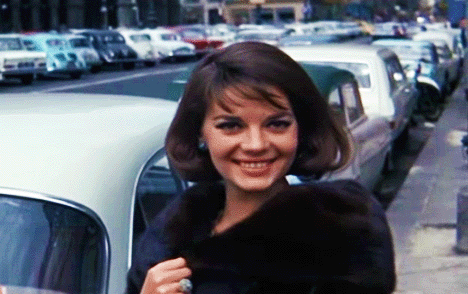
My last post was about the film Penelope which was released in 1969. In the subsequent 10 years Natalie made several films both for the big screen and for television. In 1971 she made Bob & Carol & Ted & Alice which was a commercial success but I found the movie to be boring and unfunny. Then, after a 5 year break, she made Peeper with Michael Caine. It was supposed to be a screwball detective comedy but the only thing that I remember about it was that I didn’t like it.
In 1976 Laurence Olivier asked Natalie Wood and her husband (again), Robert Wagner to co-star with him in the TV version of Cat on a Hot Tin Roof. This was a dream come true for Natalie since she had revered Vivien Leigh and was honored to work with Leigh’s husband and frequent co-star on material of this caliber. However, and maybe not shockingly, the only person who is not terrible in the movie is Laurence Olivier as Big Daddy. I guess he can do anything. By the time I watched three bad movies in a row, I was beginning to think I should just stop the Natalie Wood series. I never wanted to bash the memory of someone who worked so hard. It seems disrespectful.
However, in 1979 she had three features released which I thought may have promise so I kept going. One was Meteor with Sean Connery. She got this part because she could speak some Russian. It is a typical 70′s disaster film and held no surprises and was overall pretty underwhelming.
She also made the TV miniseries From Here to Eternity, for which she would win her only award. A Golden Globe for Best Actress in a Television Series - Drama. This really disappointed me for two reasons. One is I really like the Golden Globes and her winning this was disappointing because she was not good in the part so why did she win? And two, I watched the entire mini-series on Youtube to honor Natalie Wood’s award-winning work and then ended up with nothing good to say about it. It was a shame really.
Then finally, I hit the jackpot with the made-for-TV Movie The Cracker Factory. Understand I had no hope that I was going to enjoy this. I had to watch it on Youtube. It’s got an after school special vibe. But Natalie Wood was fantastic.

She plays a woman who cracks up from alcoholism. Her husband puts her in a hospital-type program where she resides with downright crazy people. Some of the story is ridiculous. But I was first hooked in when they showed Natalie Wood drinking alone in a basement or den and sort of mumbling and talking to herself and then going into her bedroom in the middle of the night pounding on her sleeping husband to explain this revelation she’s had while intoxicated. And it seemed so real to me. I was hooked in.
Then we find Shelley Long (Cheers) is also a patient at this hospital and that’s more fun than a barrel of monkeys. And we journey with Natalie through her trials and recovery and I even liked the end of the film which thoroughly surprised me. Not because the ending was surprising but because, seriously, some of the story was ridiculous and I expected it to get mucked up at the end. But Natalie Wood excelled and got to play a woman who would do anything to keep her family together. It felt good and it felt authentic.

It’s really worth your time to find this one on Youtube. If you want to see Natalie in a role that called for a 41-year-old woman to play it. I found her just outstanding.
I’m sorry to say I gave up trying to find the next-to-last film she made, which was The Last Married Couple in America. I did find a TV interview with her talking about the film on the Dick Cavett show or Johnny Carson or something. She seemed nervous to be interviewed on live TV and I couldn’t find the film to rent so I passed.
Her last film, Brainstorm, was in production when she died in 1981. Her co-star was Christopher Walken and was one of the last two or three people to see her alive. The film is weird. But what parts Natalie completed before her death are not bad.
At the time of her death in 1981 she was beginning rehearsals for the live theatre version of Anastasia. She was excited and nervous having never done live theatre.
I tried hard this summer to focus on Natalie Wood’s life and not her death. Since both her daughters have expressed their acceptance of their mother’s accident, I have no right to delve further or suggest it might have been different.
And anyway, Natalie Wood’s life was more interesting than her death. She worked and supported a family from the time she was 4 years old. She survived and sometimes thrived in Hollywood. She was the last generation to grow up in the Hollywood system. She had the power and the drive to link old Hollywood with new.

And she was damn cute.
So long Natalie Wood. Thanks for spending your summer with me.
#natalie wood#my summer with natalie wood#the cracker factory#bob & carol & ted & alice#from here to eternity#meteor#the last married couple in america#brainstorm
4 notes
·
View notes
Text
In Two Minds: the polymorphous proficiency of Jonathan Miller
Sir Jonathan Miller was precocious polymath. Pretty much all the tributes to Jonathan Miller, who died aged 85 on 27 November 2019, end up using the term “Renaissance Man” at some point. Miller had a mastery of arts and science that few achieve. He was a doctor who specialised in neurology, a satirist, comedian, television broadcaster and writer, and theatre and opera director in which his transformative productions of classic plays and operas made him one of the most admired, as well as one of the most controversial, figures in the late-twentieth century theatre and opera.
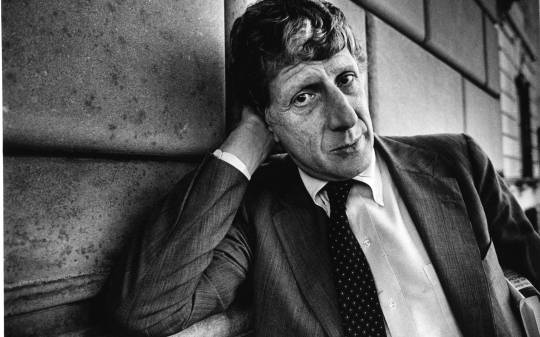
Jonathan Wolfe Miller was born in 1934 in London. His father, Emanuel, was a child psychiatrist and his mother, Betty, a novelist and biographer. He had a sister, Sarah, who died in 2006. He attended St Paul’s, an independent day school, where he formed an intellectually precocious triumvirate with Oliver Sacks, later renowned as a neurologist and author, and Eric Korn, the writer and antiquarian bookseller. The three remained firm friends until Korn died in 2014 (Sacks died a year later). At Cambridge, Miller was a member of the Apostles, an exclusive intellectual club, as well as Footlights, the dramatic society.
Miller studied medicine at Cambridge University where he was a member of the Apostles, an exclusive invitation only intellectual club (past members included Bertrand Russell, Wittgenstein, John Maynard Keynes, Rupert Brooke, E.M. Forster, as well as more notoriously the infamous Cambridge spies, Anthony Blunt and Guy Burgess).
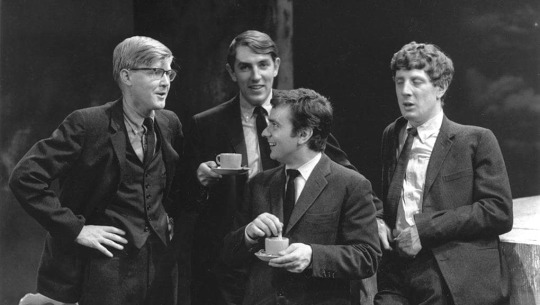
It was at Cambridge that he also joined the Cambridge Footlights, the university’s legendary theatrical comedy club, and performed in the club’s Footlights revues. Miller’s success as a Footlights star in the 1950s brought him to the attention of the producers of a new comedy stage revue, Beyond the Fringe, which opened in Edinburgh in August 1960. Subsequent transfers to London’s West End (1961) and to Broadway (1962) made Miller and his three Oxbridge educated co-stars - Alan Bennett, Peter Cook and Dudley Moore - instant celebrities.
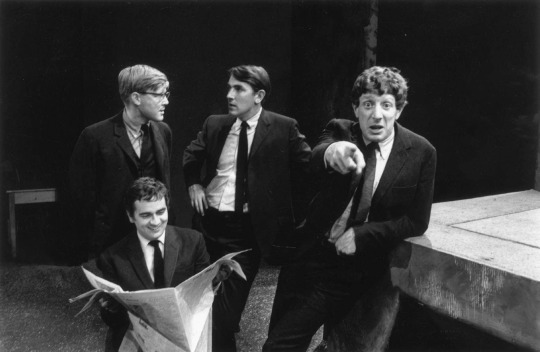
Beyond the Fringe was in the vanguard of a new generation chipping at the walls of the establishment and poking fun at the rigid pomposity of british class and society in the 1960s. In many ways Beyond the Fringe pioneered a path for the next generation of Oxbridge satirists, Monty Python, to take up the baton and beat it over the head of the establishment.
Miller, who qualified as a doctor in 1959 and maintained a special interest in neurology and neuropsychology, returned periodically to the practice of medicine, but spent most of his working life as a stage and opera director.
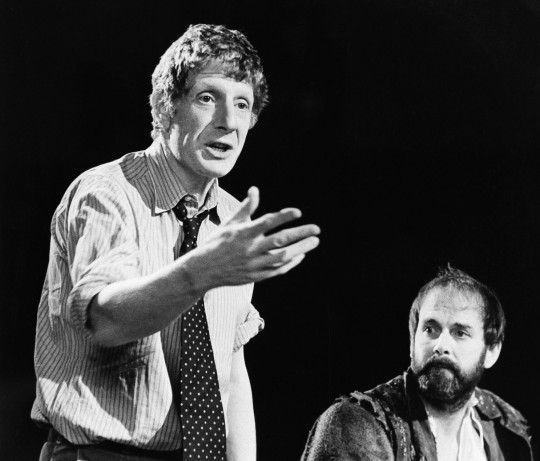
Miller’s first directing assignment was John Osborne’s Under Plain Cover in 1962. Miller made his U.S. directing debut in 1964 with The Old Glory, a play by poet Robert Lowell that inaugurated Off-Broadway’s American Place Theater.
Within a few years, Miller’s work at Nottingham Playhouse and other venues brought him to the attention of Laurence Olivier, then the head of the National Theatre. Miller’s memorable productions at the National, where he was an associate director during the Olivier years, included The Merchant of Venice, set in nineteenth-century Venice with Olivier as a top-hatted Shylock, and The School for Scandal. In 1974, Miller directed a season of three thematically linked plays at London’s Greenwich Theatre, presenting Hamlet, Ghosts and The Seagull as “Family Romances” and using the same actors for each play. Miller later served a two-year term as artistic director of the Old Vic in London (1988–90).
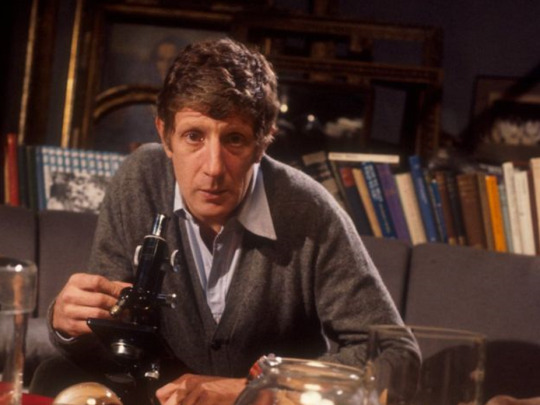
At his best, Miller had no equal for wit, originality or sheer invention as a director, especially in pieces that engaged his passion for storytelling fully; Miller’s universally admired brilliance as a conversationalist made him a coveted talk-show guest in both the U.K. and the U.S.
Miller was also a compelling television writer and presenter, with the documentary series The Body in Question (1979) and Madness (1991) among his credits. When he was in mid-career, Miller began to balance his work in the theater with directing opera—despite the fact that he never learned to read music. Miller’s opera productions were manifestly intelligent and well-informed, but occasionally overbusy, loaded with cultural references and staging touches that did little to advance the action—or support the music.
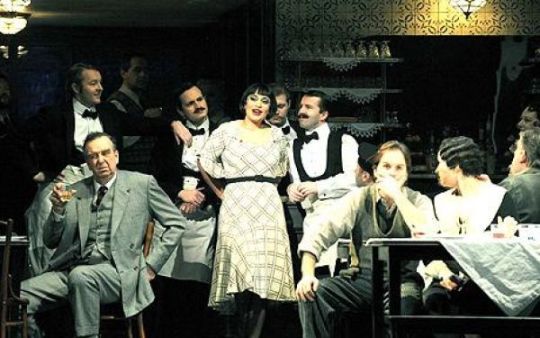
Miller’s first opera production was the 1974 British premiere of Alexander Goehr’s Arden Must Die at Sadler’s Wells Theatre in London; Alan Blyth, writing in Opera, called Miller’s production “severe, and in the end, debilitating.” The Goehr opera was to be one of the few contemporary pieces that Miller directed: in opera, as well as in the theater, he preferred to work on the production of classic works or the occasional rarity. Miller made his Glyndebourne debut in 1975, with the company premiere of Janáček’s Cunning Little Vixen.
He had especially fruitful working relationships with Kent Opera, where he directed a wide variety of repertory, including Così Fan Tutte, Falstaff, La Traviata, Eugene Onegin and Monteverdi’s L'Orfeo.
The British company with which Miller was most closely associated was English National Opera (ENO), which offered a gala celebration of his work with the company in 2016. At ENO, Miller’s vividly detailed stagings included La Bohème, Aida, The Barber of Seville, Carmen, Der Rosenkavalier, La Traviataand The Elixir of Love. Miller’s biggest ENO successes were his popular “Little Italy” staging of Rigoletto (1982) and a re-imagining of The Mikado (1986) that set Gilbert and Sullivan’s Japanese-themed operetta in an English resort hotel; both were presented in the U.S. and have been have been revived in London and elsewhere numerous times. Miller bowed at Covent Garden in 1993, with a modern-dress staging of Così Fan Tutte.
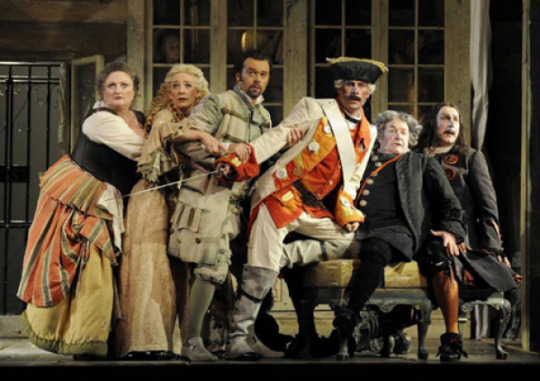
Miller made his U.S. opera debut in 1982, directing Così Fan Tutte for Opera Theatre of Saint Louis. His other North American productions included Bach’s St. Matthew Passion at BAM; La Traviata at Glimmerglass Opera and New York City Opera, Eugene Onegin at Santa Fe Opera, La Bohème at Cincinnati Opera, Così Fan Tutte in Washington, D.C. and Tristan und Isolde in Los Angeles. In Europe, Miller directed La Traviata for Paris Opéra, Der Fliegende Holländer in Frankfurt and a Fascist-era staging of Tosca in Florence. On Broadway, Miller directed Jack Lemmon and Kevin Spacey in Long Day’s Journey Into Night (1986) and Christopher Plummer in King Lear (2004).
Miller directed four operas for the Met. His 1991 staging of Janáček’s Kát’a Kabanová was an unqualified success - a stark, stylized vision of the opera’s harrowing emotional world, designed by Robert Israel and Gil Wechsler. The critical and response to Miller’s other Met stagings—Pelléas et Mélisande (1995), The Rake’s Progress (1997) and Le Nozze di Figaro (1998)—was generally positive, but Miller’s outspoken criticism of what he saw as the Met’s lack of support for him damaged his relationship with the company, and he was never given another new production there.
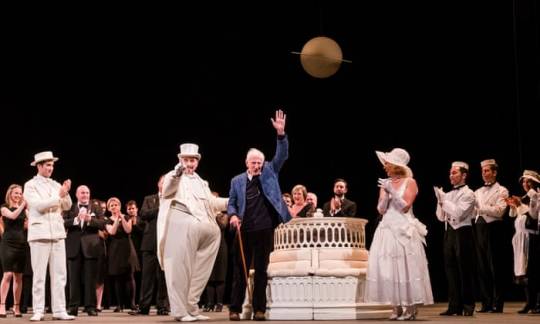
His style of directing especially opera revolved around two maxims, “One is constantly fighting a battle between two forms of idiocy,” he said of the business of opera directing, the first being “mindless traditionalism” and the second the requirement that “the work be relevant to our time”.
As a theatre director, mostly at the National Theatre in London, he sought to avoid those two forms of idiocy when directing Shakespeare, which he did for the BBC in the early 1980s. A production of a Shakespeare play, Miller thought, should not try to preserve it in the aspic of spurious authenticity.
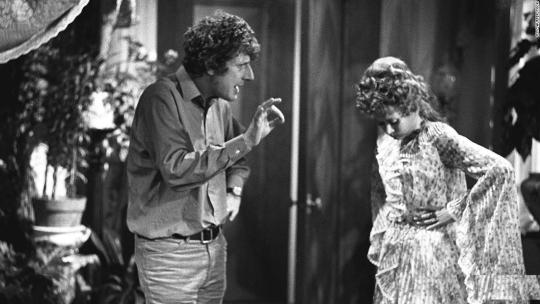
Miller was a lifelong atheist and in 2006 he was appointed president of the Rationalist Association. Accepting the appointment, he said: “There is a large unrepresented constituency of people for whom religion doesn’t enter their heads.” But while his atheism was unbending, it was not militant. Miller maintained that the job of this “community” of unbelievers was not to extirpate religious beliefs but to “analyse them with an objective curiosity and a kind of anthropological attitude to what people do”.
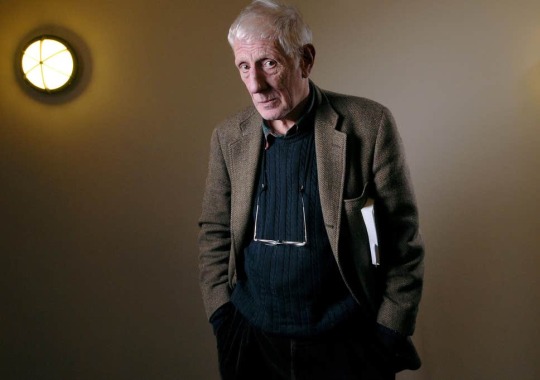
Miller displayed that intellectual humility and profound curiosity in everything he did. Indeed he once said, “I wasn't driven into medicine by a social conscience but by rampant curiosity.“ The same drive he said for his artistic pursuits. Kate Bassett called her informative 2012 biography of Miller In Two Minds, which captured this split in his life. Miller was haunted by his decision to abandon the medical profession where he had hoped to excel.
Ironically Miller rejected the oft-applied title “Renaissance man"as a “vulgar journalistic slogan”. He would argue that, “What they’re really saying is I’m a jack of all trades and a master of none.” He may have felt that “this footling flibbertigibbet world of theatre” was a distraction from higher pursuits - which is to say, the use of his Cambridge medical degree but these twin artistic and scientific interests seemed less opposed than complementary. If, as is said in “The Body in Question,” “by acting in and upon the world we remodel our own image in it,” everybody’s in show business, anyway.
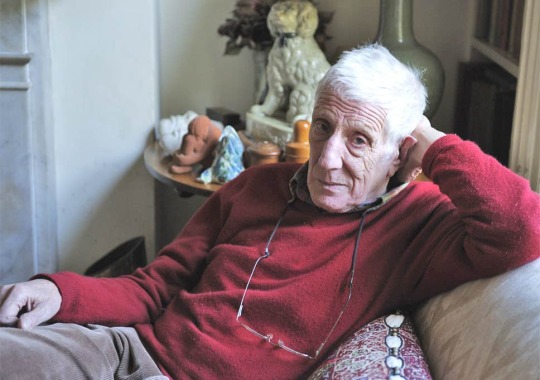
To my mind, Miller’s arts and science background enabled him to cross disciplinary boundaries and make exciting connections and open new creative possibilities. He was the perfect riposte to that very British Two Cultures intellectual debate (1959-62) between F.R. Leavis and C.P. Snow, which focused on the lack of conversation between arts and science. If we consider how scholars now embrace interdisciplinarity, we should note that Miller blazed the trail. Miller should also be viewed as one of the architects of liberal Britain in the post-war period. He rejoiced in being an irreverent free thinker. And we should rejoice at having had the privilege of peeking into the polymorphic proficient mind(s) of one of this century’s creative and most curiousity driven of men.
I had the privilege of having meeting him on one or two occasions. Twice over dinner through my parents who were active patrons of the arts.
One of my older sisters is a neurologist and we were placed either side of him. Jonathan was ever so affable and down to earth. He immediately set about making us laugh with his forensic wit and life observations. Between courses he would flit (not a typo, he didn’t flirt) between my sister and myself. With her he would talk shop about neurology and the latest scientific breakthroughs and with me we talked about opera, theatre, and the classics.
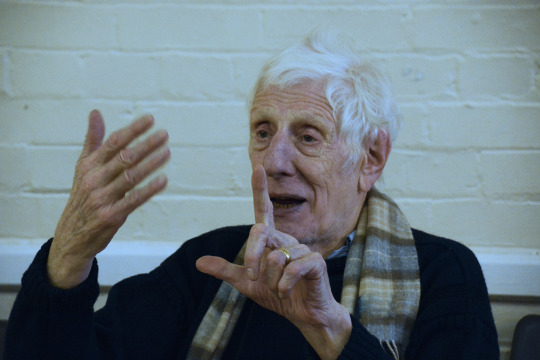
The funny thing was as the evening wore on his kinetic mind was a speeding race car and he suddenly forgot which lane he was driving in i.e. he forgot to whom he was speaking to between the two of us. So he would speak about realism theatre of Euripides with my older sister and neurological disorders with me. My older sister - I hate to admit this in print because she will lorde it over me until the end of days - was educated and eloquent enough to keep the conversation effortlessly flowing.
I would like to say that I too upped my game and rose to such elevated heights of scientific discourse but alas I fell like Icarus...but faster, as my mind felt like lead balloon tied to a one ton dead weight. I fell hard. He could see the tumbleweeds rolling across my vacant mind through my clueless eyes. Ever the gentleman he steered me to more friendly topics like the psychology of killing as I was seriously torn between going Sandhurst to become an army officer or returning to Cambridge to do a PhD. I saw him once or twice after that in other private settings and I always came away glowing because I learned some new curioisity about our human condition and the artistic ways we express the human condition in all its foibles and pathos.
RIP Jonathan Miller.
30 notes
·
View notes
Link
A wonderful article about the recent blossoming of the Keanu orchid ....
By Stephanie Zacharek
June 21, 2019
One of the great things about living in the modern world is that everyone is finally hip to Keanu Reeves. Right now he’s everywhere: Not just in the superb sequel John Wick: Chapter 3—Parabellum, but on talk shows, as a character in the upcoming video game Cyberpunk 2077, and as a hotter-than-hell but also endearingly insecure Canadian daredevil doll in Toy Story 4. He’s on Buzzfeed answering the public’s questions as puppies scramble around him, and he has a cameo in a Netflix romantic comedy, Always Be My Maybe, playing a version of himself, if he were sort of a jerk, which, from all reports, he surely is not. Reeves has become the Internet boyfriend du jour, thanks in part to a series of photographs swirling around the web that show how respectful he is when posing with random fans—or even with Dolly Parton—taking care to avoid anything that could be construed as inappropriate touching. Keanu enthusiasts have even launched a change.org petition to make him TIME’s Person of the Year. That choice is made solely by TIME editors, but hey, you never know.
Keanu here, Keanu there, Keanu, Keanu everywhere: This is a 54-year-old overnight sensation who has been making movies since 1986, the year he appeared in Tim Hunter’s teens-in-trouble thriller River’s Edge. At last, he’s getting the unqualified love he deserves, and those of us who have always loved him can rest easy. Now is not the time to gloat.
Who are we kidding? Of course it’s the time to gloat. There have always been people who love Reeves, ferociously and defensively, as a personality and as a vibe. How could you not like him as a time-traveling, mop-headed swain in the Bill and Ted movies, as a surfing cop in Point Break, as earnest, searching Neo, the One, in The Matrix movies? But historically, even people who like Reeves as a performer have often been quick to add that they’re not sure he’s a good actor. Before the Internet, there was a thing called dinner parties, and when the conversation turned to Keanu Reeves, you could be assured of hearing some variation of the following: He’s a bad actor. What he does is not really acting, he’s just playing himself. He’s good in action roles. He’s OK but he really shouldn’t attempt Shakespeare. He has no emotional range. He’s just bad.
The problem most likely lies not with Keanu’s gifts as a performer but with a general perception of what good acting is. People are often afraid to say anyone is a good actor, unless it’s Meryl Streep. They don’t want their judgment to be found wanting, and thus they make their own insecurities the actor’s problem. In 1993, it was almost impossible to defend Keanu’s performance as the resentful, conflicted villain Don John in Kenneth Branagh’s Much Ado About Nothing without being laughed at. It’s true he’s not Shakespearean in, say, the Laurence Olivier mode—he hasn’t lived inside the words of Shakespeare for a lifetime, perpetually kicking away at the best and truest ways to push those words out into the world. His Shakespearean acting is a movie-star version, a kind of pop interpretation that speaks to us more through an understanding of movie images than through deep Shakespearean study.
At one point, the preternaturally miserable Don John lies on a massage table, his muscles being worked over by Richard Clifford’s Conrade, who seems to feel his friend’s unrest rippling through his skin and asks him about it. Don John springs from the table. Anger and envy have been coiled inside him like the instinctive energy of a snake—they snap out into the air, a visible force. This physical outburst sets us up for a flurry of bitter but self-aware words: “Though I cannot be said to be a flattering, honest man, it must not be denied that I am a plain-dealing villain.” The line spins out in a pinwheel of self-degradation. This Don John knows himself, and hates himself for it.
Is this good acting, merely effective acting, or neither? No matter where you stand, I don’t think you can watch Reeves’ Don John and claim he doesn’t understand the character—his intelligence works its way through muscle and bone as well as heart and head. It’s performance as vibration. This might be the key to all that Reeves does an actor, including his magnificent gifts as an action star. Movement is acting, speaking is acting, listening is acting, just being is acting: Reeves reminds us of all that, often silently. There’s thought behind everything he does, and reading those waves of thought is part of the process of watching him.
We often talk of movie stars in the old-Hollywood studio-system sense, charismatic and distinctive personalities—like Cary Grant or Barbara Stanwyck or Bette Davis—who always look like some version of themselves but who create memorable characters by layering multiple, complex veils over their own particular mysterious essence. Maybe Reeves is one of the few modern-day actors whose style fits that model. He doesn’t work elaborate origami folds to transform himself into a character; instead, he beams radio signals from within. With a trim crewcut or a lanky shag, with a stubbly mug or a clean-shaven one, with a scowl or a slow-burning smile, he’s always starting from the base camp of Keanu.
None of this, though, answers the question of why Keanu, and why now? Other actors have passed through similar portals, seemingly expendable one minute and exalted the next. Before there was a Keanussance, there was a McConnaissance, the point at which Matthew McConaughey shifted from being an efficient actor in lame romantic comedies to being taken seriously in movies like Magic Mike and Dallas Buyers Club. The catchphrase became, “Wow, that guy can really act.”
But the recent blossoming of the Keanu orchid is different, maybe because, over the years, Reeves has proved that he doesn’t always need to be the center of attention. He launched a small art-book publishing house, X Artists’ Books, in 2018. He co-produced, and appeared in, the 2012 documentary Side By Side, an exploration of the differences between traditional photochemical filmmaking and digital processes. He has always been guarded about his private life, though we do know that in 1999 his then-partner, Jennifer Syme, gave birth to a daughter, who was stillborn. In 2001, after the couple had broken up, Syme died in a car accident.
We know this because it was reported at the time, and because it’s right there on Reeves’s IMDb page. But we don’t know about it because he’s talked about it a lot—he hasn’t. Reeves has erected some sturdy barriers against us, and yet somehow the membrane between his public life and what he truly thinks and feels seems fragile and permeable. What’s more, Reeves doesn’t seem to spend a lot of time on the Internet. Unlike most of us, he lives in the real world, and he makes it seem like a pretty good and grounded place to be. When People magazine, on the red carpet for the Toy Story 4 premiere, asked Reeves how he felt about the Internet-boyfriend stuff, he responded with a ripple of surprise: “I’ve been what?” When the interviewer elaborated, he smiled quietly, as if only to himself. “That’s wacky,” he said, clearly amused as he registered this new-to-him but not-to-us information, quickly adding, “But the positivity’s great.”
He also speaks candidly—on television, in the public eye—about things that would leave many of us speechless. In early June he appeared on The Late Show with Stephen Colbert to promote John Wick 3, answering the usual questions about what it’s like to fight while you’re on the back of a horse, and so forth. And then Colbert almost stopped time itself by asking a strange, potent question, as if knowing that if anyone might have the answer, it would be this radiantly centered person sitting just a few feet away: “What do you think happens when we die, Keanu Reeves?”
Colbert presented the question jauntily, as at least a half-joke, both courting and getting a laugh from the audience. That audience may or may not have known about the personal losses Reeves has suffered; they may or may not have known that Colbert lost his father and two of his brothers in a plane crash when he was 10. But what they know or don’t know matters so much less than the way Reeves responds, with composure and generosity and grace: “I know that the ones who love us will miss us.” Keanu Reeves is the man of the moment. Keanu Reeves is trending. Keanu Reeves is hotter than hot. But when our attention turns elsewhere, as it inevitably will, Reeves will still be out there surfing, not worrying whether we’re watching him or not. Because surfing, not trending, is the way to keep going.
15 notes
·
View notes
Photo
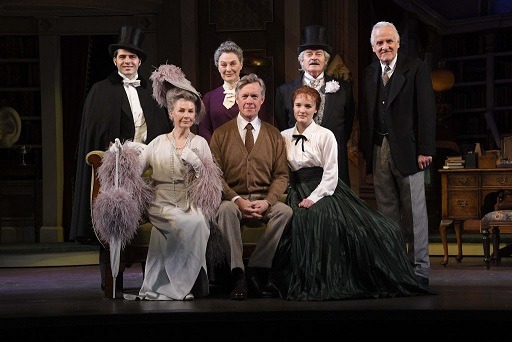
Notes on a fair lady
As an icon of screen and stage makes her Australian directing debut, her "gorgeous" aura has made a lasting impression on her cast, writes LISSA CHRISTOPHER.
'It was a complete no brainer," says Alex Jennings of his decision to take up the role of Henry Higgins for a third time. In this instance, it came with the opportunity to be directed by the legendary Dame Julie Andrews, to visit Australia for the first time and to relish what the 59-year-old feels is probably his "last chance" to play the eccentric professor of phonetics in a credible way.
Rex Harrison - My Fair Lady's first Henry Higgins - was still reprising the role well into his 70s. "But I do not want to be doing that," says Jennings. "You'd have to find an actress in her 90s to play your mother, Mrs Higgins, for a start, and then there's the whole relationship with Eliza. Is it a romance? I know older men do marry much younger women, but I think it's slightly queasy-making if the gap gets too big."
Jennings is one of those high-calibre, never-seen-in-Who-magazine British actors whose faces are probably more recognisable than their names, particularly for Australian audiences. His career has been focused primarily on the stage - he's a veteran of the Royal Shakespeare Company and the National Theatre - but he has had some significant film roles. He played opposite Maggie Smith, as the writer Alan Bennett, in The Lady in the Van, for example, and Prince Charles in The Queen.
He has appeared in a number of well-known British TV series, from Whitechapel to New Tricks to Foyle's War and later this year, viewers will see him as the Duke of Windsor in the Netflix series The Crown.
Every story about Jennings, including this one, points out that he is the only person in history to have won uber-prestigious Laurence Olivier theatre awards for performances in the comedy, drama and musical categories, the last for his first rendition of Henry Higgins, in 2003.
Jennings has such a deep, clear and resonant speaking voice that the timber and steel table between us, in a small rehearsal room at Opera Australia's Surry Hills headquarters, seems to vibrate slightly under its influence. It's a beautiful voice and narrating audiobooks is also a big part of Jennings' professional repertoire. His register is particularly low today, he says, because the cast did a full run-through of the show the day before.
My Fair Lady is a taxing show, particularly for him and his co-star, Anna O'Byrne as Eliza Doolittle. To sustain your voice over the season, he says, "you have to warm up, warm down, keep hydrated, steam". Then, adopting a plummy tone, "You have to tend your instrument."
The upcoming Australian production of My Fair Lady celebrates the musical's 60th anniversary and is a homage to the original, successful Broadway production, starring Julie Andrews and Rex Harrison.
Jennings says he was nervous about meeting Andrews for the first time - "I mean, she is an icon really, isn't she?" - but he soon relaxed in the 80-year-old's "gorgeous" company. Somewhat heavy-handed attempts on the part of your correspondent to wring a morsel of gossip or criticism from Jennings about Andrews end in failure.
"No! She doesn't have any strange habits!" he says. "She is fan-tastic. Honestly. Just fantastic. Working with her is like a masterclass. It's amazing. And very sort of touching to see her revisiting something she did 60 years ago. Her staging instinct is immaculate. Her notes are incredibly detailed. She is so fantastic and generous with the ensemble, and gorgeous to be around. She is amazing. Amazing. Amazing."
The 2003 production of My Fair Lady was the first musical of Jennings' career.
"It was sort of the obvious one for me to do because ... you don't need to be a beautiful singer," he says. He went on to do Candide and a long West End run as Willy Wonka in Charlie and the Chocolate Factory. His singing, he says, has come along in leaps and bounds, with help from the renowned voice coach Mary King. "I always feel slightly nervous about saying I can sing, probably because someone will say 'well, go on then', but I can sing." He says he has spent time working with the voice coach on really singing - rather than talk-singing - Higgins' lyrics. "I wanted to see how far I could go with that, but Julie is pushing me in the opposite direction - to sing less. It makes sense. His songs are patter songs and you can do more with the lyrics if you speak them than if you adhere to the notes."
O'Byrne, who as Eliza spends much of her time on stage with Jennings, says he brings a sense of playfulness to the production. "He's a joyful person, a lot of fun to be around on a personal level, and professionally, his skill level is so high. His attention to detail and his willingness to play around with new things on stage is wonderful to watch."
The role of Eliza is a huge one. O'Byrne has played Christine in The Phantom of the Opera and its sequel, Love Never Dies, but never a role with as much stage time as this. "It's one of the dream roles in music theatre," she says. "Eliza has so much strength and bravery. She is the most human character I've done on stage. But on a practical level, the trickiest thing is keeping the storytelling strong all the way through."
Andrews, who created the stage role of Eliza when she was 21 years old, encouraged O'Byrne to make the role her own. "She didn't want a carbon copy and I don't think that would be right in our version of the show, so I've felt great freedom in that respect," she says.
After decades of highly respectable success as a theatre actor, including his dream job playing Hamlet with the Royal Shakespeare Company, Jennings says he wouldn't mind a bit more Hollywood-style celebrity in his life. "When I was doing publicity for The Lady in the Van, being flown first class to LA and being picked up in nice cars and things like that, that hadn't been my career, really, but I thought oh, hello, this is quite nice."
He even harbours what appears to be a near-genuine ambition to appear on Strictly Come Dancing, the popular British version of Dancing with the Stars. "I don't actually think I could do it. It's such hard work, but they seem to have such a good time ... My agent doesn't want me to do it though and I haven't been asked, you know. I don't have that kind of profile."
In the meantime, Jennings and his wife, Lesley Moors, a landscape gardener, make do as enthusiastic amateur hoofers. It transpires that Fred Astaire rather than, say, Laurence Olivier, was Jennings' childhood idol. "I've always been quite a nifty disco boy ... We are party dancers and Prince is very big in our lives. We mourn him."
My Fair Lady opens opened at the Sydney Opera House on September 6.
Lissa Christopher
Sydney Morning Herald
3 September, 2016
#alex jennings#my fair lady#uk actors#alex jennings interviews#sydney opera house#henry higgins#dame julie andrews#julie andrews#musical theatre#opera australia
11 notes
·
View notes
Text
Peter O’Toole Blog Hot Artwork(Pics) Netflix Mature Sizes Weight Affairs
Peter O’Toole Blog Hot Artwork(Pics) Netflix Mature Sizes Weight Affairs
You Can Search PETER O’TOOLE UNDERPANTS SIZE CHEST SIZE MUSCLE SIZE OR ENDORSEMENTS, KATE O’TOOLE UNDERPANTS SIZE CHEST SIZE MUSCLE SIZE OR ENDORSEMENTS, LORCAN O’TOOLE UNDERPANTS SIZE CHEST SIZE MUSCLE SIZE OR ENDORSEMENTS, PETER O’TOOLE HIDDEN HOT SCENES WHY DELETED IN HARRY POTTER, KAREN BROWN PETER O’TOOLE HIDDEN HOT IMAGES, PETER O’TOOLE HOTX AND ROMANTIC MOVIES AND TV SHOWS LIST, PETER…
View On WordPress
#Are Domhnall Gleeson And Brendan Gleeson Related?#How Long Is Lawrence Of Arabia Film?#How Many Characters Did Warwick Davis Play In The Harry Potter Movies?#How Many Different Actors Have Played Dumbledore?#How Many Times Was Peter O Toole Nominated For An Oscar?#How Much Did The Lawyers Get In The Erin Brockovich Case?#How Much Is Sir Alec Guinness Worth?#How Much Money Was Peter O Toole Worth?#How Old Is Actor Albert Finney?#How Old Is Bjorn?#How Old Is Joan Plowright?#How Old Is The Actor Christopher Plummer?#How Old Was Alec Guinness When He Played Obi Wan?#How Old Was Alec Guinness When He Was In Star Wars?#How Old Was Gregory Peck When He Was In Roman Holiday?#How Old Was Laurence Olivier When He Died?#How Old Was Richard Harris When He Passed Away?#How Old Was Vivien Leigh When She Starred In Gone With The Wind?#How Tall Is Bjorn?#Is Brendan Gleeson Married?#Is Dumbledore In Gladiator?#Is Ed Masry Still Alive?#Is George Savalas Telly Savalas Brother?#Is Joan Plowright Still Alive?#Is Michael Gambon Still Alive?#Is Omar Sharif Dead Or Alive?#Is Peter O Toole Dead?#Is Peter O Toole Still Alive?#Is Richard Harris Still Alive?#Is Sir Michael Gambon Dead?
0 notes
Text
Armie's interview that will set the tongues wagging
Can't believe they're not sharing pictures of Armie splayed across the bed! 😞
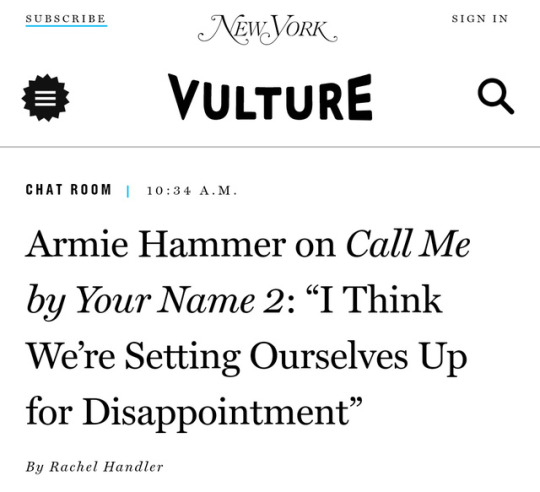

When I walk into Armie Hammer’s suite at New York’s Crosby Hotel, Hammer is splayed across the be. It’s the middle of the day on a Saturday, and Hammer is still fully dressed in a maroon sweater, black jeans, and sneakers. “I’m not going to be laying down here during the interview, I promise,” he says. “This is going to be like therapy — I’m going to lay down on the couch.” In one fluid motion, the six-foot-five actor peels himself off the bed and relocates to the couch, kicks up his feet, and smiles. “Can we talk about my deepest fears?” he deadpans.
We’re in his suite to talk about something similarly daunting: Hammer’s new movie, Hotel Mumbai, in which he plays a tourist on holiday in Mumbai with his wife (Nazanin Boniadi) and baby when a series of terrorist attacks begin to unfold across the city. Directed by Anthony Maras, the film is based on the real 2008 Mumbai terror attacks, and though many of the characters (including Hammer’s) are composites (rather than based on real victims), the film is a bleak, difficult watch. It’s also something of a departure for Hammer, who’s beloved in the public imagination for cavorting sexily through Italy with Timothée Chalamet.
So perhaps it’s appropriate that we’re talking about Hotel Mumbai in patient-therapist format. We also delve into some less-bleak subject matters: the status of Call Me by Your Name’s much-anticipated sequel, whether Hammer is going to play the Invisible Man or Batman, and why he’s suddenly gone quiet on social media.
Hotel Mumbai is a very dark, very violent film. Why take it?
The script was incredible. Brutal. It was just dripping with humanity. And I saw a few of Anthony’s short films, and he made a short film called The Palace that was so fucking intense that I literally had to pause it at one point and stand up and pace around the room. And be like, “What is he doing? Why is he doing this to me? This is a personal attack! I’m being attacked by this man and this direction!” And I thought, If he can do this in a short …
How were you able to get in and out of this really dark place on set?
I had no choice, really. You’re being pursued by men with guns, screaming at you in a language you don’t understand, running through smoke-filled corridors. It felt really firsthand. And also, it was a very serious set. And not just because the subject matter is so intense, but because we all couldn’t help but just feel and be reminded that people had really gone through this. And they didn’t have the luxury of yelling “Cut!” when things got too intense for them. It was really somber, and the way we dealt with that was to celebrate each other’s presence at night. We’d go to dinner and just sit and have meals and talk and just laugh and joke and have wine, and really try to enjoy life, knowing that these people didn’t have that opportunity. We were filming in a situation where the idea of life felt really fleeting, so we tried to make the best of it at night.
Was your family on set?
Elizabeth [Chambers, Hammer’s wife] was there. Harper [Hammer’s daughter] was there. Not on set on set, because there was a lot of gunfire and blood. Elizabeth was like, “Aah, I don’t want to do this.” And Harper is so young, I don’t want to subject her to that.
You’re subjected to some serious violence in this movie. Was it particularly upsetting for Elizabeth or your family to see you in this one?
The overall violence was more upsetting than [mine] specifically. Just feeling like you were in a first-person terror attack was really jarring. So it was about the bigger issue more than me — that this shit happens, and that fucking sucks. It just happened again [in New Zealand]. How about we just stop fucking shooting each other? Antiquated, extremist ideas. Xenophobic philosophies. Extremism, indoctrination. Enough. It’s so dumb.
You’ve been pretty politically outspoken on Instagram and Twitter, but lately you’ve gone quiet. What’s that about?
Healthy emotional boundaries.
When did you put those up?
Not soon enough. [Laughs.] It was fun for a while, the whole social media thing — “I can say whatever I want,” “Ooh, that got me in trouble,” “Oh, I can say this,” “Ooh, that got me in trouble, too.” It’s a dangerous dance partner. You might have a moment of fun dancing, and then it’s gonna stomp on your feet. I’m just like, I’m getting too old for this shit. I’m done.
Was there a specific moment where you were like, “I’m done”?
No, it was kind of gradual. It was a generalized thing, built up of specific moments.
Like when you were fighting with Jeffrey Dean Morgan?
Yeah. Part of me was like, “Oh, Jeffrey Dean Morgan, really, lashing out here? Methinks thou doth protest too much, my man! Do you feel guilty about posting a picture of you and Stan Lee after he died?” [Laughs.]
I heard a rumor someone lost a hand while filming Hotel Mumbai
No, the director lost a thumb! He stuck it into a fan by accident. In India, they don’t have the same safety precautions; they don’t have OSHA. He tried to move a fan that didn’t have a grate over it. His thumb went into it and it just went [makes the noise of a thumb being cut off by a fan]. It shot blood everywhere. And Dev [Patel] ended up finding the thumb on the floor; they ran on foot to a hospital. Tried to reattach it, and they couldn’t.
He has no thumb?
He’s got, like, half a thumb.
How long did it take to start filming again?
He was out for three days in the hospital, and finished directing the movie from a hospital gurney on set.
Holy shit, really?
Yeah, it was hilarious. This was toward the end of the movie.
I have to ask about the Call Me by Your Name sequel. It’s in my contract.
Is it really?
No, but we do care so much. So what’s the latest?
Timmy’s out! I’m not sure why. Timmy said the only way he’d do it is if they paid him $15 million. [Laughs.] No, the truth is, there have been really loose conversations about it, but at the end of the day — I’m sort of coming around to the idea that the first one was so special for everyone who made it, and so many people who watched it felt like it really touched them, or spoke to them. And it felt like a really perfect storm of so many things, that if we do make a second one, I think we’re setting ourselves up for disappointment. I don’t know that anything will match up to the first, you know?
The experience of filming it, or the movie itself?
Both.
Do Timmy and Luca feel that way, too?
I don’t know. I haven’t had that conversation with them explicitly. But I mean, look. If we end up with an incredible script, and Timmy’s in, and Luca’s in, I’d be an asshole to say no. But at the same time, I’m like, That was such a special thing, why don’t we just leave that alone?
That’s new, though, because you’ve said for a while now that you guys were saying it was definitely happening. What shifted for you?
I’m not sure that it was ever really definitely going to happen. People just seemed so excited about it that we were like, “Oh, yeah, fuck it! We’ll do it, sure!” [Turns to publicist.] Was it ever really like, real real
Publicist: I think it’s not real until it is.
Hammer: It’s not real until it is. And I won’t do it for less than, uh, $10 million! [Laughs loudly.]
So there’s no script or concrete plans.
No. I was talking to Luca, and he was like, “I think it might be fun to do this, or it might be fun to do this!” And I was like, “Those all sound like great ideas!” But that’s as real as it is right now. And I was joking about $10 million. I want $12 million.
Okay, I’ll make sure to write that down.
$12.5 million actually. Let’s go $12.5 million. Plus 10 percent commission for my agent. [Laughs.]
When was the last time you talked to Timmy and Luca?
Timmy and I texted yesterday. Luca, I talked to him the day of the Indie Spirit Awards.
The last time you spoke to Vulture, you did this great profile with Kyle Buchanan. And you spoke about how, in certain ways, you had fallen in love with Luca on set. When he read that profile, what was his response to it?
It didn’t really come up. But it was the thing we both felt. It’s not like he read it and was surprised. He was like, Aw, nice of you to say. I feel the same way. It’s a really intense process to make a movie in a foreign country. And when you do it with people you really resonate with, it forms a special bond.
I’m really excited about your upcoming remake of Rebecca. How are you going to make your version of Maxim de Winter different, Armie Hammer–ish?
Well, he’s going to look like me. It’s funny because we’re still really getting into it. There’s a new draft of the script coming up soon, and Ben [Wheatley] is such an amazing director and so collaborative that I feel like we’re going to come up with something really interesting and different than the Laurence Olivier version. With that being said, we haven’t started getting into it yet. It’s a couple months out; we’re filming this summer.
And what about these Invisible Man rumors?
I recently read those myself! What is the Invisible Man?
It’s part of Universal’s Dark Universe.
What is the Dark Universe?
They tried to build a franchise around their classic monsters, like Frankenstein.
Okay. I don’t know what that is. I’m not against it! So it’s a peripheral universe?
They had these big plans to create a universe, and it failed, and there are rumors they’re trying to restart it again … with you.
Shows you how much they’ve talked to me about it. I haven’t heard anything about it from anyone who makes actual decisions. I read about it online: “Armie Hammer might play the Invisible Man.” I was like, “Okay! Do I have to be in it?”
That’s true, because you’re invisible.
I know, that’s the thing! Voice-over job? That would be so easy. I would do that in a second.
You could literally phone it in.
I would literally phone it in!
Do you have a Google alert for yourself?
No, no, no. That’s part of the healthy emotional boundaries. I feel like a lot of the things on the internet, like Twitter, are largely populated by the people that go on Yelp and write one-star reviews just to be like, “Fuck that place!” I don’t want to take the brunt of that. I used to. Full disclosure, I used to have a Google alert for myself, and search myself on Twitter. It never gave me anything other than anxiety, so I was like, “Maybe it’s best to just not do this.” If you don’t Google yourself, and you don’t know about something, it doesn’t exist at all.
Though you did know about the Invisible Man.
I did. Because I get asked about that, and also about Batman: “Are you gonna do Batman?” I’m like, “No …” They’re like, “Are you gonna do the Invisible Man?” And I’m like, “Who is making these calls?! No!”
Which man will you be, Armie?
The bat or the invisible? But, no, neither.
#armie hammer#cmbyn#call me by your name#onthebasisofsex#hotel mumbai#hotel mumbai movie#taj mahal palace hotel#taj hotel#armie batman#the batman#batman#invisible man#dark universe#vulture culture#armie hammer and dev patel#dev patel#nazanin boniadi#anthony maras#lucaguadagnino#luca guadagnino#armie x dakota#dakota johnson#timothée chalamet#armie x timothee#elio oliver#oliver elio#elio x oliver#oliver#032019 armie hammer#armie hammer interview
9 notes
·
View notes
Text

Who did David Essex play in the original 1978 stage production of 'Evita'?
David Essex (born 1947) played Che Guevara in the original 1978 West End production of Andrew Lloyd Webber's 'Evita'. The musical is based on the life of Eva Perón (1919-1952), the wife of Argentine President Juan Perón. The show won the Laurence Olivier Award for Best Musical and opened on Broadway a year later, where it became the first British musical to receive the 'Tony Award for Best Musical'.
The story is narrated by Che, who is typically played by a 21-35 year old tenor. It begins on 26th July 1952, the day Eva Perón dies, before going back in time to 1934, when Eva is only 15 years old. Che relates how Eva makes her way up the social ladder, becoming a model, radio star, actress, and finally the First Lady of Argentina.
Elaine Paige (born 1948) starred opposite Essex as the lead female character, Eva Perón. They sang a couple of duets during the show, including 'High Flying, Adored'. The most notable song in the show, however, is 'Don't Cry For Me Argentina', sung by Eva alone.
David Essex is an English singer, songwriter, and actor who, as of 2021, has attained 19 Top 40 singles in the UK and 16 Top 40 albums. He has also had an extensive career as an actor. As well as 'Evita', he has performed on stage in 'The War of the Worlds' (1978), and on screen in 'EastEnders' (2010). In 1999, Essex was named an Officer of the Order of the British Empire (OBE).
1 note
·
View note
Text
Welcome, naughty children, to my latest Richard III rant! This time, we'll be talking about how I think Richard III is usually played way too old and why I think his youth is an important trait to depict onstage! So, Richard III is usually played by older actors. It makes sense, in a way- it's a very major and challenging role that dominates his play, so of course theatre companies would want to cast an experienced actor, especially one who will likely sell a lot of tickets. And as a character whose perceived ugliness is important to the storyline, it's a good opportunity for those who have aged out of young leading man roles like Romeo and Hamlet. Ian McKellen was in his fifties when he played Richard, Laurence Olivier in his late forties. But I don't think that's the most authentic way to portray the character. First of all: history. Obviously Shakespeare plays fast and loose with historical fact, but the real Richard died at the age of 32. Yes, that's right, he was younger at the time of his death than Richard II, who is usually played as very youthful, younger than Eddie Redmayne. In fact, Shakespeare's histories truncate history somewhat, portraying the play as occurring only slightly after King Henry Vi's death (his coffin is on display when Richard woos Anne. The real Richard married Anne at around age 20. If Shakespeare is condensing 13 years into this play, does that mean Richard is really only in his twenties? Second of all: Continuity and context. In Shakespeare's Henry Vi part 3, Richard's role as the youngest brother is emphasized. He's referred to as a "prodigy," called "Dicky, your boy," and a reference is made to his cracking, adolescent voice. Richard gets along well with his older brothers as they fight in war together until they begin settling down, getting married, and starting families; that is when he realizes how different his path must be from theirs, that at an age when other young men are pursuing love, he can only pursue power. On top of that, Richard's brother, Edward, is portrayed as a charismatic, swaggering young man in Henry Vi part 1 but is dying in Richard III. Most stage productions, divorced from the context of Henry Vi, imply that he is an old man whose death was sad but expected, but actually, Edward was only 40 when he died of a sudden illness. The frantic confusion surrounding his death is important to the play- a clear plan was never put into place about what would happen if Edward died while his sons were still children. He made Richard the lord protector in a last-minute deathbed decision. That takes me to another facet of Richard's characterization in the play: his intense disdain for Queen Elizabeth, his brother's wife. Elizabeth was about 6 years older than her husband with grown children from a previous marriage. That makes her about 15 years older than Richard, who constantly makes snarky references to her age, referring to her "experience" and her advanced age both to her face and behind her back. He continually puts down older women and thinks of women as useful for nothing but their wombs and property claims, even killing his young wife in the hope of obtaining an even younger one, but it is three older women- his mother, Queen Margaret, and Elizabeth-- who give him the real psychological snack down. Elizabeth absolutely destroys him in their scene together, a powerful matriarch who has seen right through him from the start. Why do I always see an older Richard dominating a young and vulnerable widow Elizabeth onstage? Third of all: original performance. Shakespeare's leading man, Richard Burbage, most likely originated the role of Richard. He would have been in his twenties when first playing Richard-- younger than when he played those famous "leading man" roles, Romeo and Hamlet, that most actors tackle before "aging into" Richard today. Fourth of all: modern day resonance. Yes, this is all very well and good, you might say, but nowadays, we want to see a Richard who reflects our political reality. He should be a stand-in for whatever old sleazy dudes are in power in America at the moment. Maybe. But Richard on the page reminds me of another kind of dangerous man altogether. A young man born into privilege and fortune, but with a deep-seated sense that life has been unfair to him, an obsession with violence, intense misogyny and hatred of men who are more successful with women, and a predilection toward long soliloquys detailing his twisted world view? That reminds me of infamous mass-murderer Elliot Rodger, who killed 6 people and injured 14 at UC Santa Barbara in 2014. Rodger uploaded a long video explaining his motivations. Wikipedia says, "He explained that he wanted to punish women for rejecting him and that he envied sexually active men so he wanted to punish them for their sexual activity." In Richard III's own soliloquys, he plots to destroy those who preoccupy themselves with love and sneers at those who caper in ladies' chambers and make their heavens in ladies' laps. He plots to conquer women who detest him and destroy men who trust him. There is a specific, deadly kind of self-pitying rhetoric seen in online forums dedicated to "incels"-- men who are involuntarily celibate-- like Elliot Rodger. They overemphasize their concepts of female shallowness, believing that bodily and facial proportions and physical attractiveness are the most important thing to women, that those who fall short of these standards are seen as "subhuman" and cursed to never know love. The idea that it is their behavior, not their appearance, that makes them repugnant to women never seems to occur to them, or to Richard. Elliot Rodger was not a bad-looking man, but he was a reprehensible one. In our modern world, I'd like to see more Richards portrayed as less literally physically deformed and more preoccupied with the idea of being seen as deformed or otherwise untouchable, getting revenge against a world that he sees as having rejected him. What do you think?
225 notes
·
View notes
Text
“WUTHERING HEIGHTS” (1939) Review

"WUTHERING HEIGHTS" (1939) Review
Considering the popularity of the Brontë sisters, it is not surprising that there have been considerable movie, stage and television adaptations of their novels. I discovered there have been at least fifteen (15) adaptations of Emily Brontë's 1847 novel, "Wuthering Heights".
I might as well be frank . . . I am not a major fan of the novel. I never have been. I do not dislike it, but I have always preferred the famous novels of the author's two sisters - namely "Jane Eyre" (1847) by Charlotte Brontë and Anne Brontë's 1848 novel, "The Tenant of Wildfell Hall". For some reason, "Wuthering Heights" depresses the hell out of me. I have nothing against works of fiction laced with tragedy. But the heavy barrage of emotional and physical abuse, revenge, and over-the-top passion has always seemed a bit too much for me. Due to my less-than-enthusiastic regard for Ms. Brontë's novel, I have always been reluctant to watch any of the television or movie adaptations, with the exception of one - the 1939 movie produced by Samuel Goldwyn.
Directed by William Wyler, and starring Merle Oberon and Laurence Olivier; "WUTHERING HEIGHTS" told the story of the passionate and doomed love story between one Catherine Earnshaw, the daughter of a Yorkshire landowner and an orphaned Gypsy boy named Heathcliff. The story opens with Mr. Earnshaw introducing Heathcliff to his family - Cathy and her brother, Hindley - at Wuthering Heights. While Cathy immediately befriends Heathcliff, Hindley becomes jealous of his father and sister's high regard of the newcomer. Heathcliff's pleasant life with the Earnshaw family ends when Mr. Earnshaw dies and a resentful Hindley forces him to become one of the family's servants.
Despite Heathcliff's new status within the Earnshaw family, his close relationship with Cathy remains close. Some eight to ten years later, the now adult pair have fallen in love and are meeting secretly on Penniston's Crag. One night, Cathy and Heathcliff are out when they discover the Earnshaws' neighbors, the Lintons, giving a party at the Grange. After climbing the garden wall, Cathy is attacked by a dog. The Lintons take Cathy in to care for her and Heathcliff is ordered to leave the Grange. Cathy becomes close with Edgar Linton and entranced by his wealth and glamour, while Edgar falls in love with her. When Edgar decides to propose marriage to Cathy, his action leads to a major fallout between Cathy and Heathcliff, the latter's departure for United States, his return, jealousy, obsession and in the end, tragedy.
As far as I know, the 1939 film eliminated the second half of Brontë's novel that centered on the generation featuring Heathcliff and Cathy's children. This elimination has led many fans of the novel to dismiss this version as a poor adaptation. Well, to each his own. I have never read Brontë's novel. And this is probably why I have such difficulty in dismissing "WUTHERING HEIGHTS" as unworthy of the novel. The only way I can judge the movie is on its own merits. And quite frankly, I believe it is one of the better costume dramas to be released during Hollywood's Studio Era.
Producer Samuel Goldwyn assigned his top director, William Wyler, to helm the movie. And Wyler did a superb job. Thanks to his direction, "WUTHERING HEIGHTS" turned out to be an atmospheric and well paced movie filled with superb performances by the cast. Wyler utilized the talents of cinematographer Gregg Toland, along with art designers James Basevi and Alexander Toluboff to re-create the novel's setting - the brooding Yorkshire moors with exquisite details.
The movie's most controversial aspect turned out to be Charles MacArthur and Ben Hecht's screenplay. Many present-day critics believe that the two screenwriters took the bite out of Brontë's novel by romanticizing Heathcliff and Cathy's relationship. Literary critic John Sutherland accused Wyler, Hecht and MacArthur of portraying Cathy as a more passive character, willing to accept Heathcliff's abuse. Personally, I cannot help but wonder how he came to this conclusion. My recent viewing of "WUTHERING HEIGHTS" recalls a capricious and manipulative Cathy unable to hold back her scorn of Heathcliff in the face of the Lintons' wealth and glamour; and a Cathy more than determined to prevent Heathcliff and Isabella Linton's marriage. Not once do I recall a passive Cathy willing to accept abuse from Heathcliff.
Other critics of the movie have also accused Wyler and the two screenwriters of robbing Heathcliff the opportunity to seek revenge against Cathy and the Linton family by deleting the second half of the novel. These same critics seemed to have forgotten that a good deal of the movie's second half focused not only on Heathcliff's return to England, but also his efforts to get revenge on both the Earnshaw and Linton families. He did this by acquiring Wuthering Heights from an increasingly dissolute Hindley Earnshaw and more importantly, seeking Isabella Linton's hand for marriage. The latter finally reached its mark as far as Cathy was concerned. The emotional damage from Heathcliff's marriage to Isabella led to Cathy's death and tragedy. The biggest criticism that emerged from "WUTHERING HEIGHTS" was Samuel Goldwyn's decision to set the story in the mid-Victorian era, instead of the novel's late 18th and early 19th centuries setting. It is believed that Goldwyn made this decision either because he preferred this period in costumes or he was simply trying to save a buck by using old Civil War era costumes. Personally, I could not care less. The novel's setting was merely accelerated by five to six decades. And since "WUTHERING HEIGHTS" did not utilize any historical facts in its plot, I see no reason to get upset over the matter.
"WUTHERING HEIGHTS" went into production as a vehicle for actress Merle Oberon, who was a contract player at Goldwyn Studios. When Laurence Olivier, her co-star from 1938's "THE DIVORCE OF LADY X", was cast as Heathcliff, he campaigned for lover Vivian Leigh to replace Oberon as Catherine Earnshaw. Olivier's efforts failed and Oberon kept her job. Many critics believe that Leigh would have done a better job. I refuse to accept or reject that belief. However, I was very impressed by Oberon's performance. She did an excellent job in capturing Cathy's capricious and shallow nature. Although Oberon had a few moments of hammy acting, she was not as guilty as two of her co-stars. I find it rather disappointing that she failed to earn an Academy Award nomination. Her scene with Geraldine Fitzgerald (in which Cathy tries to dampen Isabella's interest in Heathcliff) and the famous soliloquy that ended with Cathy's "I am Heathcliff" declaration should have earned her a nomination.
Laurence Olivier made his Hollywood debut in the role of the Gypsy orphan-turned-future owner of Wuthering Heights, Heathcliff. Olivier harbored a low opinion of Hollywood and screen acting in general. But Wyler's exhausting style of directing and tutelage enabled Olivier to drop his penchant for stage theatrics and perform for the camera. Mind you, I do not believe Wyler was not completely successful with Olivier. The actor still managed to display hints of hammy acting in his performance. And he did not seem that successful in his portrayal of a Heathcliff in his late teens or early twenties, in compare to Oberon, who seemed successful in portraying Cathy in that same age group. Regardless, Olivier gave a first-rate performance, and managed to earn the first of his ten Academy Award nominations.
Another performer who earned an Academy Award nomination was Geraldine Fitzgerald, for her performance as Isabella Linton. I cannot deny that she deserved the nomination. Fitzgerald gave a memorable performance as the passionate, naive and outgoing Isabella, who found herself trapped in an emotionally abusive marriage to a man that harbored no love for her. However, I believe that like Olivier, she was guilty of a few moments of histronic acting. I could never accuse David Niven of such a thing. The actor gave a solid performance as the quietly loving, yet privileged Edgar Linton. Flora Robson was superb as the story's narrator and Cathy Earnshaw's maid, Ellen Dean. And both Niven and Robson proved to be the production's backbone by being the only cast members that managed to refrain from any histronic acting altogether. I can also say the same about Hugh Williams' portrayal of the embittered and dissolute Hindley Earnshaw. Donald Crisp, Leo G. Carroll, Cecil Kellaway and Miles Mander also gave fine support.
I realize that "WUTHERING HEIGHTS" will never be a favorite of the fans of Brontë's novel. But as a movie fan, I cannot look down at this production. Thanks to William Wyler's direction, Gregg Toland's photography, solid adaptation by Ben Hecht and Charles MacArthur, and superb acting from a cast led by Merle Oberon and Laurence Olivier; it is quite easy to see why it is considered as one of the best examples of Old Hollywood during one of its best years - 1939. I guess I will always be a fan.
#emily bronte#bronte sisters#wuthering heights#wuthering heights 1939#William Wyler#old hollywood#samuel goldwyn#period drama#Laurence Olivier#merle oberon#david niven#geraldine fitzgerald#donald crisp#flora robson#hugh williams#leo g. carroll#cecil kellaway#miles mander#gregg toland
3 notes
·
View notes